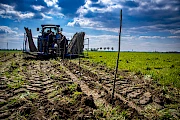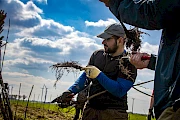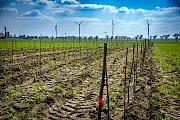News
August 2025
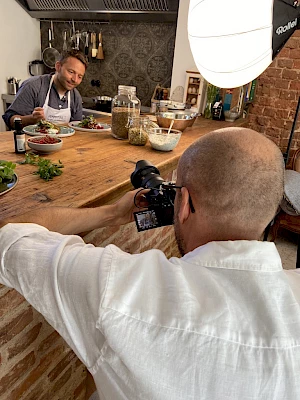
Es gibt Drehtage, die rauschen einfach vorbei – und dann gibt es die, die bleiben im Kopf. Unser Linsenfilm gehört eindeutig zur zweiten Sorte.
Begleiten Sie uns in die Küche von Thomas Marbach, Anstalt für Koch- und Lebensmittelkultur bei Leipzig, wo dampfende Töpfe, klackernde Messer und der Duft frischer Kräuter die Bühne für ein ganz besonderes Gericht bereiten: Linsen Pojarski. Was als einfaches KEINREZEPT begann, wurde schnell zu einer Liebeserklärung an die unscheinbare Linse.
Weiter geht’s aufs Feld zu Patricia Tanneberger ins Erzgebirge. Hier erwartete uns kein Feld mit einer Monokultur, sondern ein bunter Mix aus verschiedenen, teils sehr alten wiederentdeckten Sorten. Zwischen Leindotter wächst die Linse heran, diesmal auch zwischen anderen Unkräutern wie die Distel. Von der zarten Pflanze bis zur mühsamen Handarbeit beim Reinigen: Hier sehen Sie, wieviel Hingabe in jeder Packung steckt.
An den zwei Tagen haben wir nicht nur Aufnahmen gesammelt, sondern Geschichten, Begegnungen und Eindrücke, die unseren Film tragen sollen. Die Reise der Linse – vom Acker in die Küche – ist eine Geschichte voller Leidenschaft, Handwerk und Genuss. Und wenn Sie den Film gesehen haben, hoffen wir, dass Sie nicht nur Appetit bekommen, sondern auch ein Stück dieser Begeisterung schmecken, die wir an diesen Tagen erlebt haben.
Juli 2025

Es gibt Drehtage, die laufen einfach so durch – und dann gibt es Drehtage, die bleiben hängen. Unser Linsenfilm war definitiv einer von der zweiten Sorte. Von dampfenden Töpfen bis zu knirschendem Feldweg – hier kommt unser Blick hinter die Kulissen.
Morgens bei Thomas Marbach – Linsen in Aktion
Der Tag begann in der Küche von Thomas Marbach, ANSTALT für Koch- und Lebensmittelkultur in der Nähe von Leipzig. Noch war es draußen ruhig, aber drinnen blubberte es schon im Topf. Zwiebeln wurden geschnitten, Kräuter gezupft, Linsen abgewogen. Der Duft – eine Mischung aus erdiger Wärme und frischer Würze – lag sofort in der Luft.
„Wir machen heute *Linsen Bujarski*,“ grinste Thomas, während Fotograf Jörg Simanowski schon mit der Kamera um den Herd schlich. *Klack, klack* ging das Messer übers Brett, *zisch* das Gemüse in der Pfanne – und jedes Detail landete im Sucher. Wir merkten schnell: Das hier wird nicht einfach nur ein Rezeptvideo. Das wird eine Liebeserklärung an die Linse.
Feldluft bei Patricia Tanneberger

An einem weiteren Drehtag ging’s aufs Land ins Erzgebirge, hinter Dresden. Bei Patricia Tanneberger erwartete uns kein Feld mit einer Monokultur, sondern ein bunter Mix aus verschiedenen, teils sehr alten wiederentdeckten Sorten. Zwischen Leindotter wächst die Linse heran, diesmal auch zwischen anderen Unkräutern wie die Distel. Überall summte und raschelte es. „Hier wächst alles zusammen,“ erzählte sie, während sie behutsam eine Linsenpflanze für uns pflückte. Der Wind strich durchs Feld, und wir hielten einfach die Kamera drauf – manchmal ist die Natur selbst der beste Regisseur.
In der Scheune zeigte uns Frau Tanneberger, wie die Linsen gereinigt werden. Keine große Maschine, sondern viel Handarbeit. „Viele sehen nur die Packung im Laden,“ sagte sie, „aber nicht, wie viel Zeit und Geduld drin steckt.“ Genau diesen Moment wollten wir festhalten – die unsichtbare Arbeit sichtbar machen. Zum Schluss ging es noch in ihren Hofladen. Regale voller Linsen, liebevoll beschriftet, daneben andere hausgemachte Produkte aus dem Umkreis.
Zwei Drehtage voller Begegnungen

An diesen Tagen haben wir nicht nur Aufnahmen gesammelt, sondern Geschichten, Begegnungen und Eindrücke, die unseren Film tragen werden. Die Reise der Linse – vom Acker in die Küche – ist eine Geschichte voller Leidenschaft, Handwerk und Genuss. Und wenn der Film fertig ist, hoffen wir, dass ihr nicht nur Appetit bekommt, sondern auch ein Stück dieser Begeisterung schmeckt, die wir an diesem Tag erlebt haben.
Mai 2025
As in 2023 and 2024, the Dresden Environmental Center is once again enriching the Dresden Palais Sommer this year with its food education mission under the slogan “Pulses from Saxony: From the field to the plate!”. Opportunities for greening city centers and urban farming activities are inspiring more and more people who want to eat locally and grow their own food. Urban gardening initiatives and other communities are becoming increasingly popular as a result. At the annual Palais Sommer Festival, the concepts of sustainability and regionality are now taken very seriously.
Culture-loving event visitors can look forward to a rich regional buffet. Lentil sprouts on the salad, baked potatoes with herb quark from next door, hearty buns from Dresden and meat products from local farms make the catering a regional culinary specialty. The aim was also to promote more regional and healthy eating. The Dresden Environmental Center and the OLGA project already drew attention to this topic last year with its raised beds of peas, beans, lentils and more. This year, they are once again located at the Green Oasis next to the morning yoga sessions, inviting visitors to read, relax and enjoy.
März 2025
Im Auftrag der Landeshauptstadt Dresden, Amt für Wirtschaftsförderung, führt die STESAD GmbH eine Analyse zu den kommunalen Märkten durch. Untersucht wird, wie Märkte zur Belebung der Dresdner Innenstadt beitragen können und welche Anpassungen es dafür bedarf. Mit einer Umfrage möchten sie herausfinden, wie die Wochenmärkte in der Innenstadt (Lingnermarkt und Bauernmarkt auf der Königstraße) von der Bevölkerung genutzt werden und ob es Wünsche nach Veränderungen gibt.
Die Ergebnisse der Umfrage fließen in die Empfehlungen für die zukünftige Gestaltung der Märkte ein.
Die Befragung richtet sich sowohl an regelmäßige Besucherinnen und Besucher der Wochenmärkte als auch an Personen, die nur selten oder gar nicht einen Wochenmarkt besuchen.
Agroforestry, or agroforestry for short, describes land uses that combine woody plants with agricultural or horticultural crops and/or the keeping of livestock.
In cooperation with DeFAF e.V., new postcards have been created for the founding of the Saxony regional group.
If you would like to join us or send a postcard, please download it here!
So wird Agroforst sächsi How agroforestry becomes saxony
Sachsen, wo die schönsten Agroforste wachsen Saxony, where the most beautiful agroforests grow
Sachsen kann Agroforst Saxony can do agroforestry
Für mehr Gegacker auf dem Acker For more clucking in the field
Februar 2025
We have a delicious baking tip for you - lentil bread, a recipe by Veronica Schmidt-Cotta (inspired by Günther Weber, master baker from Lorettohof in the Swabian Alps). A slice of bread, full of protein, with all the essential amino acids and high-quality unsaturated fatty acids. That's why we like to call this lentil bread survival bread, because it simply has everything you need.
The speciality here is the regional lentils, which give the bread its full-bodied flavour, it keeps for a long time, doesn't dry out so quickly thanks to the cooked lentils and is very filling.
For two loaf tins
✔ 2 tbsp sourdough (or 10g yeast)
✔ 500g wholemeal rye groats
✔ 200g regional lentils (e.g. plate lentils from Eckhard Voigt from Leisnig or Landgut Tanneberger)
✔ 200g kernels/seeds (sunflower, pumpkin, hemp)
✔ 1.5kg wholemeal wheat/spelt flour
✔ 40g salt
✔ Approx. 1 litre of water
9h before baking
Sourdough + rye meal + 0.5 litres of water → leave to rest warm
Wash lentils, simmer for 15-20 min, leave to cool, soak seeds/seeds
After 9h
Mix seeds + sourdough (remove some sourdough and keep)
Add flour + salt + water → knead (consistency ≈ mortar)
Leave to rest for 1.5-2 hours (volume should increase)
Pour into greased moulds, leave to rest for 30 mins
Bake
first at 250°C for 5 min with steam, then at 230°C for 15 min and then at 200°C for 45 min.
Finally, remove from the tin and bake upside down for a further 5-10 minutes.
Leave to cool, enjoy and give some as a gift!
Am 17. und 18. September 2025 feiert das Forum Agroforstsysteme seine 10. Ausgabe! Unter dem Motto „Vielfalt pflanzen, Agroforst skalieren“ laden der DeFAF e.V. und die Justus-Liebig-Universität Gießen herzlich dazu ein, Teil dieses besonderen Jubiläums zu werden.
Das Forum ist die zentrale Plattform für den Austausch und die Vernetzung zwischen Wissenschaft, Praxis und allen, die sich für Agroforstwirtschaft begeistern. Gemeinsam wollen wir Perspektiven entwickeln, Erfahrungen teilen und die Verbreitung von Agroforstsystemen voranbringen.
Reichen Sie Beiträge für folgende Formate ein:
Vorträge: Kurze Fachbeiträge
Poster: Präsentation Ihrer Forschung oder Praxisprojekte in zwei Postercafés
Workshops: Interaktive Formate (ca. 2 Std.) zu zentralen Themen der Agroforstwirtschaft
Deadline: 18. März 2025
Januar 2025
It's not just the year 2024 that is coming to an end. Also the OLGA project will officially end at the end of March 2025. We don't want to withhold the activities of the last few months from you - unless you were there yourself ;-). That's why we have compiled information about the activities for the last months for you, such as the newly created regional value chain for lentil falafel made from organically grown Doberquitz plate lentils and their marketing options in Dresden or the establishment of a Saxon regional group for agroforestry topics under the umbrella of the German Agroforestry Association DeFAF e.V. and much more.
Dezember 2024
On an autumnal Friday, the small district of Sieglitz in Lommatzscher Pflege was buzzing with activity. The newly founded DeFAF Saxony regional group had invited people to its first meeting - and more than 20 interested people from the city and countryside responded to the call to discuss agroforestry in depth.
“Which system is suitable for my land? What are the costs? Where can I find support for implementation? Who can I cooperate with? And how can I apply for funding?”
These and many other questions were the focus of the meeting. The participants brought very different perspectives with them: Some already had concrete ideas on how they could integrate agroforestry systems on their land. Others found out about the leasing regulations that apply when timber is planted on arable land. There were also curious visitors who simply wanted to find out more about agroforestry as one of the key strategies for the transformation of agriculture.
The autumnal atmosphere and the gently rolling hills of the Lommatzscher Pflege region provided the perfect setting for exchange and networking. While aromatic fruit juice from the region, freshly brewed coffee and home-baked cakes provided for the physical well-being, lively discussions, new ideas and initial approaches for cooperation arose.
The DeFAF Saxony regional group would like to continue to promote dialog in the future and is planning regular formats such as online get-togethers, field days and specialist workshops. Are you interested in becoming part of this community?
Then please get in touch at sachsen@defaf.de
November 2024
Im Interview: Raphael Weber von der Stadt Leipzig, Anke Hahn von der Stadt Dresden, Dr. Christa Standecker, Geschäftsführerin der Metropolregion Nürnberg, Hermann Weiß, Landrat von Neustadt an der Aisch-Bad Windsheim und Armin Kroder, Landrat des Landkreises Nürnberger Land.
Regionales Essen liegt im Trend!
Immer mehr Menschen in Deutschland achten darauf, woher ihre Lebensmittel kommen. 2023 haben fast 90 % der Befragten gesagt, dass ihnen die regionale Herkunft von Eiern, frischem Obst und Gemüse wichtig ist.
Doch wie steht es um die Versorgung in der Stadt mit frischen Lebensmitteln aus dem Umland?
In dieser Folge des Stadt-Land-Plus Podcasts geht es darum wie man diese wichtigen Verbindungen wieder stärken kann und es werden Projekte vorgestellt, die Antworten gefunden haben – mit spannenden Beispielen aus Stadt und Land.
Der Stadt-Land-Plus-Podcast zeigt in 7 Folgen verschiedene Projekte in ganz Deutschland, in denen sich Stadt und Land in verschiedenen Lebensbereichen gegenseitig ergänzen und unterstützen. Charlotte Öken und Moritz von Schurer haben mit über 30 Personen Interviews geführt, die alle mit Stadt-Land-Plus Projekten verbunden sind.
On the day of the excursion, we were able to visit five fascinating locations that impressively demonstrated how sustainable urban-rural cooperation is put into practice. From urban education centers to innovative agroforestry projects, it became clear how versatile and future-oriented the approaches of the OLGA project are. Here is an overview of our impressions:
Our day began at the first location, the “Alte Gärtnerei” in Dresden, a place of creation, education and recreation in the middle of the city. Sebastian gave us an insight into the importance of urban and sustainable gardening. The combination of community gardens with educational opportunities for all age groups was particularly impressive. Here we were able to experience first-hand how urban agriculture brings people together and creates awareness of regional food.
We continued by bus to location 2, Verbrauchergemeinschaft Dresden e.G. in Friedensstraße. Here the VG showed how its products from the region (max. 150km radius) get directly to the consumers. In addition to pumpkin soup, there was also a lentil burger from Ali Habiballah, owner of Zaituna. He creates a variety of products from the regional Saxon lentils of Eckhard Voigt from Doberquitz near Leisnig and told us enthusiastically about the close cooperation between organic farms and urban processors - a real example of successful urban-rural relationships.
After a short breather, we drove on to the agroforestry project on the Kirchenacker in Grumbach near Wilsdruff - location 3 of our excursion. The November weather didn't stop us from inspecting this agroforestry project, but we couldn't get through the mud to the part of the system by the watercourse. Manuel Wewer from the Institute of Hydraulic Engineering at the TU Dresden was nevertheless available to answer our questions about the influence of agroforestry systems on water bodies. Johannishöhe also explained to us how poplars, for example, can be integrated into agriculture as fast-growing trees. They not only offer the advantage of wind protection, but also improve soil quality, provide wood and contribute to biodiversity. The conditions of the lease were also discussed and the special situation of church fields in agriculture was described. With the newly erected sign, many people can now find out more about the agroforestry system.
Packed with knowledge, we then moved on to the fourth location. In Graupa near Pirna, we got to know the solidarity agriculture of the Lebenswurzel association. The focus here is on community farming and regional supply. The tour of the fields made it clear how closely consumers and producers can come together. Community-supported agriculture enables direct exchange - a model that has a future. During a short warm-up break, all participants were able to try the special lupin coffee and continue to discuss regional value chains.
We reached our last location before dusk: the Sachsenforst state enterprise. The focus here was on the use of fast-growing tree species. The insight into innovative processes to promote regional value creation and the combination of forestry and sustainability was particularly exciting. The crowning finale of the day was the discussion on the continuation of the results of the OLGA project, which will come to an end next year. Snacks made from pulses from qiofood rounded off the final discussions of the evening.
The excursion impressively demonstrated how diverse the approaches to promoting urban-rural relationships can be. Each location provided practical knowledge and inspiring ideas for a sustainable future. The discussions with committed project participants were particularly enriching and showed how important cooperation and creativity are.
Our heartfelt thanks go to all the sponsors, alliance and cooperation partners and people who are passionately committed to the implementation and cultivation of agroforestry systems, regional value chains with pulses and cooperative relationships and who conjure up tasty and healthy food from the field to the plate every day. We will take away many ideas for further discussion and implementation of these approaches.
in der BMBF-Fördermaßnahme „Stadt-Land-Plus“ entwickelten 22 interdisziplinäre Verbundvorhaben innovative Lösungsansätze für die nachhaltige Entwicklung von Stadt und Land, u. a. zur Ausbildung einer regionalen Kreislaufwirtschaft und Wertschöpfung, für interkommunale Wohnungsmärkte oder zur Verbesserung der gemeinsamen Entscheidungsgrundlagen für ein regionales Landmanagement (weitere Informationen siehe www.fona-stadtlandplus.de).
Auf der Abschlussveranstaltung 2024 am 05./06.11.2024 in Berlin wurde als ein Ergebnis der Fördermaßnahme ein Memorandum „Rechtliche Hürden für nachhaltige Stadt-Land-Beziehungen“ vorgestellt. Es beschreibt für zehn zentrale rechtliche Hürden in den Clustern Ressourcenschutz und -kreisläufe, Raumordnung und Baurecht sowie Vergaberecht und Fördersystematik jeweils die Herausforderung, den Rechtsrahmen und mögliche rechtliche Anpassungsansätze.
Auf der Abschlusskonferenz konnte der Appell an alle Fachressorts und die politisch Verantwortlichen in Bund und Ländern, die Vorschläge aus diesem Memorandum eingehend und zeitnah zu prüfen, unterzeichnet werden.
Oktober 2024
Last Saturday, we paid a visit to the agroforestry system planted last year in Sieglitz near Lommatzsch (video here) on our excursion. The Lommatzscher Pflege region is known for its good soil, but also for its cleared landscapes. Hardly a tree far and wide. So what can be done to contribute more to biodiversity and a better infrastructure network in the region?
With around 15 conservationists, farmers and other interested parties, we walked from the Herrmann farm to the 1ha agroforestry area on 12ha of fields and discussed the possibilities of an agroforestry system. Five strips of woodland, each with five rows, were planted here in April 2023. The outer rows consist of poplars and the inner row of valuable trees such as wild cherry or Norway maple. The advantage here is that the value woods can continue to grow undisturbed, while the poplars can be harvested every 6 years or so and used for heating, for example. At the moment, the trees are still in the establishment phase and there are currently no intercrops between the rows. In addition, a roe deer has gobbled up a few poplars at the end of the row towards the road, so they will have to be replanted next spring.
What can we learn from the area? Agroforestry systems do not achieve the nature conservation value of a hedge, but can be combined with flower strips or certain tree species to promote biodiversity. Investing in more individual tree protection or fencing is worthwhile, especially if you know what animals are present in your area.
This flexibility and practicality of designing your own agroforestry system was particularly well received by farmers and conservationists. Everyone agreed that more support is needed for the high initial investment costs in this area and that the distribution network must continue to grow.
We will keep at it, because as the saying goes: “The path is made by walking!”.
The excursion was organized by the Meissen regional group of the German Nature and Biodiversity Conservation Union (NABU), the German Association for Agroforestry (DeFAF) and the OLGA project.
Das siebte Jahr und damit das vorletzte Jahr für die Fördermaßnahme Stadt-Land-Plus geht langsam auf sein Ende zu. Einiges wurde dieses Jahr geschafft: Publikationen wurden erstellt oder angestoßen, ein Workshop zum Thema Resilienz durchgeführt, ein weiterer zu den SDGs. Am 5. und 6. November 2024 sind mit der Stadt-Land-Plus Abschlusskonferenz - „Aus Stadt und Land wird Plus. Innovative Wege für nachhaltige Stadt-Land-Beziehungen “ noch ein letztes Mal alle Verbundvorhaben und Interessierte aus Wissenschaft, Praxis und Politik nach Berlin eingeladen. Hier werden noch einmal Austausch und vor allem Verstetigung der Ergebnisse der Verbundvorhaben im Vordergrund stehen. Aber auch ein vielseitiges, fachlich ansprechendes Rahmenprogramm wurde erarbeitet: So werden die Autor:innen des Stadt-Land-Bestsellers „Zwischen Welten“ Juli Zeh und Simon Urban als Keyspeaker Botschaften zu Stadt-Land-Plus auch „literarisch“ in Szene setzen. Für die Diskussionsrunden und Themenräume hält das Programm weitere spannende und hochrangige Gäste bereit.
Nicht nur von Klima- und Naturschutz reden, sondern auch aktiv etwas dafür tun, heißt es hier. Viermal pro Spielzeit laden Musiker:innen der Staatsoperette zu ihren Green-Box-Kammerkonzerten ein, bei denen sie Spenden für Umweltprojekte sammeln. In unterschiedlichen Formationen präsentieren die Musiker:innen hier klassische und moderne Kammermusik, während wissenschaftliche Vorträge zu ausgewählten Nachhaltigkeitsthemen oder Gesprächsrunden das exklusive Konzertformat abrunden.
Beim ersten Green-Box-Kammerkonzert der Saison 2024/2025 steht das Projekt OLGA im Mittelpunkt, das nachhaltige Landnutzung und regionale Wertschöpfung in der Region Dresden fördert. In einem Kurzvortrag widmet sich Veronica Schmidt-Cotta der Frage der „Regionalen Wertschöpfung und Nachhaltigkeit in der Landwirtschaft am Beispiel der Linse“. Darüber hinaus sollen Möglichkeiten zur Integration von regionaler Ernährung in den Alltag und bereits etablierte Wertschöpfungsketten aus Dresden aufgezeigt werden. Dafür sind Claudia Haack (Marktschwärmer Dresden) und Thomas Schindhelm (Solidarische Landwirtschaft Lebenswurzel e.V.) mit von der Partie, die ihre jeweiligen Initiativen und ihre Arbeit vorstellen. Gerahmt werden die Wortbeiträge durch das Ensemble Ampère, das den musikalischen Bogen von Haydn bis Heiden spannt.
Ensemble Ampère: Andreas Richter (Flöte), Burkhard Scharf (Flöte), Martin Borck (Cello)
Mit: Veronica Schmidt-Cotta (Projekt OLGA), Claudia Haack (Marktschwärmer Dresden), Thomas Schindhelm (Solidarische Landwirtschaft Lebenswurzel e.V.)
Kommen Sie gerne vorbei!
September 2024
At Zaituna on Saturday, as part of the Saxony Organic Experience Days, everything revolved around special flavors and high-quality regional foods. Even before the start of the event, guests flocked into the small kitchen with its rustic dining room and were eager to find out more. The idea of conjuring up oriental dishes from Saxon organic lentils in particular sparked great enthusiasm. The OLGA project supported the event with information and expert knowledge on regional cultivation and the use of pulses in everyday nutrition. This, as well as the 25 kg bag of Saxon lentils on display from farmer Eckhardt Voigt from Leisnig and the other delicious oriental samples from Ali Habiballah, provided plenty to talk about.
In a good mood, packed with knowledge and recipes, most of them asked: “Where can I buy the products so that I can cook Ali's recipes straight away?”. How nice it was to be able to answer them: “You can find local organic markets all over Dresden, where you can not only buy the lentils and other pulses, but also find Ali's fresh hummus and his organic falafel ready to eat!”. Everyone was delighted and knew that the next stop on my shopping tour would be a regional organic market in Dresden.
A small but nice addition: it was worth being there. Even Mr. Voigt from Leisnig was able to report that some people from the organic experience day at Zaituna in Dresden visited him on his farm on our recommendation and bought the regional Saxon organic lentils of wonderful quality from him.
Ali Habiballah ist Zaituna. Catering für allerlei Anlässe in und um Dresden, wo sich alles um die Begeisterung für Geschmack und hochwertige, regionale Lebensmittel dreht. Beim Bioerlebnistag verrät er ab 11 Uhr, wie Hummus die perfekte Konsistenz bekommt oder wie man Falafel aus regionalen Linsen herstellt. Es gibt bis 15 Uhr Leckeres zum Probieren und einen Einblick in die kleine Produktionsstätte in der Dresdner Neustadt. Das Projekt OLGA unterstützt die Veranstaltung mit Infos zum regionalen Anbau und dem Einsatz von Hülsenfrüchten in der täglichen Ernährung.
Anmeldung per E-Mail an veronica.schmidt-cotta@uzdresden.de
Schon davon gehört? Esskulturwandel bietet eine Weiterbildung für alle innerhalb des Lebensmittelsystems an.
Seien Sie dabei und bewerben Sie sich noch bis Sonntag!
Hier mehr Informationen:
"Die erste branchenübergreifende und praxisorientierte Weiterbildung für kulinarische Akteur:innen geht in die nächste Runde EssKulturWandel heißt: vier Impulstage, vier Praxistourtage, einmal durch das Lebensmittelsystem, in und um Berlin – für alle, die etwas verändern wollen. Für eine Transformation des Lebensmittelsystems ist das Thema “Ausbildung” in unserer Branche einer der wichtigsten Hebel für Veränderung. Es fehlt an einer Weiterbildung, fern von Seminarräumen und akademischen Angeboten, die junge kulinarische Akteur:innen befähigt und inspiriert, regenerative Landwirtschaft, transparente Wertschöpfung, bessere Arbeitsplätze, mehr Kollaborationen und eine gerechte Produktion aktiv anzugehen. Was die Haltungsform von Tieren mit gutem Fleisch zu tun hat, wie Böden das Klima beeinflussen, wie sich Regionalität und Saisonalität auf die Biodiversität auswirken – und was Du damit zu tun hast – vermittelt EssKulturWandel von der Praxis für die Praxis. Die Weiterbildung richtet sich daher an alle Azubis, Mitarbeiter:innen, Studierende und Freiberufliche innerhalb des Lebensmittelsystems."
August 2024
As in 2023, the Dresden Environmental Center once again enriched the Dresden Palais Sommer this year with its food education mission under the slogan “Hülsenfrüchte aus Sachsen: interessiert mich die Bohne!”. Opportunities for greening city centers and urban farming activities are inspiring more and more people who want to eat locally and grow their own food. Urban gardening initiatives and other communities are becoming increasingly popular as a result. At the annual Palais Sommer Festival, the concepts of sustainability and regionality are now taken very seriously.
Culture-loving event visitors can look forward to a rich regional buffet. Falafel made from regional lentils and meat products from local farms make the catering a regional culinary specialty. The aim is also to promote a more regional and healthy diet. The Dresden Environmental Center and the OLGA project drew attention to this topic with its raised beds of peas, beans, lentils and more. How can we eat more regionally? How can I integrate pulses more into my daily diet? These and other exciting questions were discussed directly on the Neumarkt in front of the Frauenkirche over a cool drink and finger food made from regional lentils. The falafel balls made from regionally grown organic Saxon lentils dipped in homemade hummus by Ali Habiballah were very well received by the visitors. See for yourself!
We are delighted to have initiated a short regional value chain for lentil falafel with the OLGA project. We are now planning to market the product via Dresden's organic food retailers. To this end, we act as an intermediary between farmers who want to grow lentils in the region and catering or other processing companies that want to integrate lentils or pulses in general into their portfolio.

Das Leguminosen-Netzwerk LeguNet ruft Landwirtschaftsbetriebe dazu auf, an einer kurzen Umfrage zum Anbau von Leguminosen teilzunehmen. Teilnahmeschluss ist der 15. September 2024.
Damit möchte LeguNet erfahren, welche persönlichen Herausforderungen Landwirtinnen und Landwirte in dem Bereich sehen. Auch Betriebsleiterinnen und -leiter, die bisher noch keine Leguminosen im Anbau haben, aber daran interessiert sind, sind herzlich eingeladen, teilzunehmen.
Die Anliegen aus der praktischen Landwirtschaft werden anschließend an Forschung und Politik kommuniziert: die Umfrageergebnisse werden im Rahmen des zweiten nationalen Leguminosen-Kongresses im Oktober 2024 präsentiert.
Vielen Dank für Ihre Teilnahme!
Hier geht es zur Online-Umfrage.

Das kirchliche Stadtfest in Geithain hatte dieses Jahr einen ganz besonderen Programmpunkt: „Agroforstwirtschaft – Klimaangepasste Landnutzung mit Vorteilen für Mensch, Tier und Natur“ titelte auf dem Bildschirm im Veranstaltungszelt, als Anke Hahn vom Deutschen Fachverband für Agroforstwirtschaft e. V. die Vorteile dieser Landnutzungsform vorstellte. Etwa 30 Geithainer:innen, hörten dem Vortrag und dem anschließenden Gespräch aufmerksam zu. Für viele war die Kombination von forstlicher, ackerbaulicher Nutzung und gar Beweidung etwas komplett Neues, nahezu eine Revolution der Landwirtschaft! Jens Heinze vom Landwirtschaftsbetrieb Johannishöhe aus Tharandt und Daniel Wilkening von der Kirchgemeinde Grumbach bei Dresden waren als Pioniere mitgekommen, um über ihre Erfahrungen bei der Pflanzung von vier Pappelreihen auf Kirchenpachtland zu sprechen. Denn die Pflanzung von Bäumen auf Ackerland hat bestimmte Auswirkungen auf das Pachtverhältnis. Die Pflanzung wurde durch das Forschungsprojekt OLGA finanziert und vom Kompetenzzentrum Ökolandbau des Sächsischen Landesamtes für Umwelt, Landwirtschaft und Geologie unterstützt. Von den Zuschauern gab es generell viel Zustimmung, aber auch kritische Meinungen bzgl. des Ertragsverlustes der Ackerfrucht und der komplizierteren Bearbeitungs- und Wirtschaftsweise, welche das System mitbrächte. Es ist also noch viel Überzeugungsarbeit zu leisten!
Großer Dank gilt dem Kirchspiel Geithainer Land, Pfarrer Helbig und Herrn Häge als Forstbeauftragter der Evangelisch-Lutherischen Landeskirche Sachsens für den Impuls, das Thema Agroforst mit aufzunehmen in das Programm des Stadtfestes.

Durch das vom Bundesministerium für Ernährung und Landwirtschaft (BMEL) geförderten Verbundvorhaben „Modell- und Demonstrationsnetzwerk für Agroforstwirtschaft in Deutschland“ (MODEMA) soll die agroforstliche Nutzung als wesentlichen Bestandteil der deutschen Agrarwirtschaft in die landwirtschaftliche Praxis integriert und so die Zahl agroforstlich bewirtschafteter Flächen in Deutschland deutlicherhöht werden. Das Projekt schafft Beispiele mit Leuchtturmcharakter, um die Agroforstwirtschaft in Deutschland zu fördern und einen Beitrag zur Stärkung der Bioökonomie im landwirtschaftlichen Sektor zu leisten. Das Kompetenzzentrum Ökolandbau des Sächsischen Landesamtes für Umwelt, Landwirtschaft und Geologie (LfULG) mit Sitz in Nossen ist aktiver Verbundpartner in MODEMA und sucht Unterstützung bei der Umsetzung der sächsischen Modell- und Demo-Beispiele.
Juli 2024
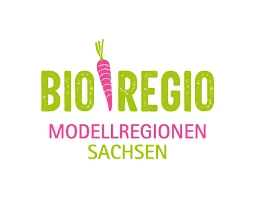 Das Staatsministerium für Energie, Klimaschutz, Umwelt und Landwirtschaft hat zu einer neuen Förderrunde für Bio-Regio-Modell-Regionen in Sachsen aufgerufen. Interessierte Konsortien können sich bis 31.08.2024 mit einem Antrag bewerben. Aktuell gibt es in der Region Leipzig und in der Lausitz schon entsprechende Kooperationsbündnisse. Deshalb sind besonders Bewerber aus den Regionen in Sachsen gefragt, wo noch kein derartiges Projekt läuft.
Das Staatsministerium für Energie, Klimaschutz, Umwelt und Landwirtschaft hat zu einer neuen Förderrunde für Bio-Regio-Modell-Regionen in Sachsen aufgerufen. Interessierte Konsortien können sich bis 31.08.2024 mit einem Antrag bewerben. Aktuell gibt es in der Region Leipzig und in der Lausitz schon entsprechende Kooperationsbündnisse. Deshalb sind besonders Bewerber aus den Regionen in Sachsen gefragt, wo noch kein derartiges Projekt läuft.
Ziel der Bio-Regio-Modellregionen ist es, dass sich Unternehmerinnen und Unternehmer aus der Land- und Ernährungswirtschaft mit weiteren Akteurinnen und Akteuren zusammenfinden, um in ihren Regionen individuelle Konzepte zur regionalen Wertschöpfung, vorzugsweise auch mit Bio-Lebensmitteln, umzusetzen und (bio-)regionale Wertschöpfungsketten zum Wohle aller zu entwickeln und zu verstetigen. Die Marktposition von regional erzeugten, insbesondere auch ökologisch erzeugten, landwirtschaftlichen Produkten soll dabei verbessert werden.
Mehr Infos zum Aufruf und den Antragsformalitäten gibt es im Förderportal des Freistaates Sachsen.

As part of a model project coordinated by the Free State of Saxony for the establishment and investigation of four agroforestry areas in arid regions of Saxony to record the effects of these regenerative systems on water, soil and species protection, as well as operational economy and utilisation of renewable raw materials (material, energy), a service provider is being sought for the planting. The service description and all further information on the award procedure and corresponding documents can be viewed on the Vergabeplattform (German!) of the Free State of Saxony. Deadline for offers in German language only is already 08.08.2024!

The field day on 21 June 2024 in the region of Wurzen near Leipzig focused on the combination of environmental services and regional value creation aspects with the growth of agroforestry systems with fast growing trees together with hedges and other landscape elements of nature conservation interest. Three different agroforestry structures on the land of farmer Frank Uhlemann between Zschorna, Hohburg and Thammenhain were the centre of interest for around 40 participants on this day. The reason for the plantings at the time were research trials carried out by the Saxony Forest Service (Staatsbetrieb Sachsenforst) on behalf of the Agency for Renewable Resources (FNR), with the harvested wood being sold to regional energy suppliers and the pulp industry.
The OLGA research project and the ongoing activities of the Competence Centre of Organic Farming as part of the Saxon State Office for Environment, Agriculture and Geology to promote agroforestry in Saxony were presented at the beginning. During the look at a field copse structure with different tree and shrub species between Zschorna and Hohburg at the first location, the main focus was on its importance for the restoration of a species-rich and structurally diverse agricultural landscapes. This is because such landscape elements primarily organise the landscape, protect it from wind and erosion and can be components of the local biotope network. Unfortunately, one farmer complained that the promotion of hedges and the willingness to authorise these structures in the Free State of Saxony was rather poor. Here, agriculture and nature conservation need to cooperate more closely, develop joint objectives and translate them into funding programmes. Agroforestry, with its diverse and multifunctional approaches to land use, is still treated with too many kid gloves in the environmental and agricultural administration in this country. As a result, the current fundings are not yet very lucrative.
After travelling to the next system planted as part of the FastWOOD project in 2014, the colleagues of Sachsenforst presented their research work on the cultivation of aspen. In this trial, the aspen clones planted by hand in a 2 m x 1 m formation were compared with ten other trial areas with aspen in Saxony in terms of their biomass growth in short rotation. This is because the productivity of these agricultural timber structures can be increased by breeding more productive varieties. The diameter of the breast height and biomass growth after 10 years differ depending on the plantation area. The differences are not dependent on the location of the trees within the plantation, but on the respective test link (in this case: in each case as the offspring of two defined parents).
At the third location, a poplar trial area with cuttings was established in 1999 with the aim of selling the harvested wood biomass to the pulp industry. In particular, the biomass growth was compared with different soil pre-treatments, plant associations and rotation times. The trial area was pre-treated with herbicides in a test variant. This resulted in better initial growth because there was no competition from the lack of accompanying vegetation. The same effect could also be achieved with mechanical weed control, but this was not investigated in this case. The wider the plantation, the less biomass is produced per hectare, as the wide spacing between the trees means that a relatively large amount of sunlight initially falls on the ground and is not absorbed by the trees. However, the growth of the individual trees is promoted by extending the plantation. If the aim is to maximise the tree dimensions and not to maximise the yield per unit area, it is therefore advisable to choose wider planting strips. This plot trial showed that the potential is far from fully utilised in the first rotation due to the necessary establishment of the plants, so that the biomass yield increases significantly in subsequent rotations (regardless of their duration).
Ever heard of Tordis, Inger and Max1? These are not Swedish national football players, but the names of different willow clones that were planted in the immediate vicinity at the fourth location of the field day near Thammenhain. The site was one of 42 other test sites that were established between 2012 and 2015 as part of the ProLoc breeding project to record clone-site interactions in poplar and willow in three- and ten-year rotations.
The agroforestry field day in Wurzener Land was a collaboration between the Uhlemann farm, the Competence Centre for Organic Farming of the Free State of Saxony, the German Agroforestry Association DeFAF, the Saxony Forestry Service (SBS) and the OLGA research project.
Juni 2024

From 8 June to 4 August 2024, the TU Dresden Botanic Garden will be focusing on the large Fabaceae family. Everyone knows beans, lentils and peas as domestic crops. But the family also has many other impressive food plants, colouring plants, spices, remedies, valuable timber and garden beauties. The topic of nitrogen fixation, cohabitation with ants and the leaf movements of the mimosa are also fascinating. Immerse yourself in the fascinating world of Fabaceae. Whether looking at the exhibition panels, reading the exhibition brochure or visiting the numerous events.
The exhibition highlights the various aspects of this unique plant family on 15 large-format, themed panels. More than 30 smaller panels are dedicated to individual species.
Exhibition Flyer (German)
On the morning of 27 May 2024, when the Lignovis trailer loaded with organic poplar planting rods of the Bakan and Skado varieties came to a halt at the edge of the field near Grumbach, it didn't take long for the planting material to be placed in the loosened soil of the two narrow and 1 km long field strips. Both areas are leased from the Johannishöhe farm in Tharandt by the parish of Grumbach with the aim of bringing more (woody) structure to the wind-exposed agricultural landscape on the outskirts of Dresden. The two double-rowed poplar strips are to provide material for the farm's wood heating system. But first they have to grow well. Other structures, such as shrub-like vegetation and hedges, and further product value creation are already being planned and will gradually supplement and enrich the system.
‘We think that agroforestry can also be used to adapt to climate change to a certain extent. On the one hand, we have trees that provide shade, and we also have synergies between the individual plants, and we also generate an additional harvest from the wood,’ says Jens Heinze from Johannishöhe Tharandt. There are plans to monitor the microclimatic effects of the structures on the soil and the neighbouring watercourse.
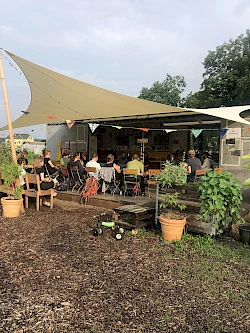 There is a great need for dialogue! That's why the Dresden and Region Food Council invites to the "Alte Gärtnerei", Dresden's urban forest garden, on 25 June 2024 from 09:30-11:00 for a network meeting between gastronomy and regional producers from the agricultural and food industry.
There is a great need for dialogue! That's why the Dresden and Region Food Council invites to the "Alte Gärtnerei", Dresden's urban forest garden, on 25 June 2024 from 09:30-11:00 for a network meeting between gastronomy and regional producers from the agricultural and food industry.
Are you looking for partnerships with regional producers or are you looking for purchasers for your seasonal products? Then you are very welcome! The aim is to strengthen the supply of regional food in Dresden's out-of-home catering sector. We would like to promote dialogue, strengthen partnerships and offer the opportunity to exchange experiences.
Are you interested? Please confirm your participation by e-mail to kontakt@ernaehrungsrat-dresden.de
DATE: 25/06/2024
TIME: 09:30 - 11:00 am
LOCATION: Alte Gärtnerei (opposite Heidestraße 21, 01127 Dresden, Pieschen district)
TARGET GROUP: local catering businesses, caterers, market gardens,
solidarity agriculture (SoLaWis) and organic farmers.
farmers
The event language will be German.
Mai 2024
 Agroforstliche Landnutzungen und deren Umweltleistungen sind aufgrund der fortschreitenden Auswirkungen des Klimawandels aktuell wieder im Gespräch. Um diese Form der regenerativen Landbewirtschaftung auch in Sachsen wieder stärker in die Fläche zu bringen, haben sich interessierte Akteure zusammengetan und fördern durch regelmäßige Treffen, Feldtage und andere Aktionen den Austausch und die Wissensbildung zu diesem Thema.
Agroforstliche Landnutzungen und deren Umweltleistungen sind aufgrund der fortschreitenden Auswirkungen des Klimawandels aktuell wieder im Gespräch. Um diese Form der regenerativen Landbewirtschaftung auch in Sachsen wieder stärker in die Fläche zu bringen, haben sich interessierte Akteure zusammengetan und fördern durch regelmäßige Treffen, Feldtage und andere Aktionen den Austausch und die Wissensbildung zu diesem Thema.
Am Freitag, 21.06.2024 ab 13:45 Uhr laden wir zusammen mit dem Ökokompetenzzentrum Sachsen, dem DeFAF e. V. und dem Staatsbetrieb Sachsenforst zu einem Feldtag zum Thema Agrarholzanbau in Kombination mit Hecken und anderen Feldgehölzen ins Wurzener Land. Wir werden drei unterschiedliche Agrarholzsysteme auf den Flächen von Frank Uhlemann, Landwirt aus Lossatal OT Thammenhain, kennenlernen und uns u. a. zu Anlage, Pflege und Ernte von geeigneten Sorten und potenziellen energetischen und stofflichen Verwertungsoptionen austauschen. Neben der regionalen Wertschöpfung werden wir auch über die positiven Effekte dieser Gehölzstrukturen in Kombination mit Hecken und anderen Feldgehölzen für den Natur- und Artenschutz sprechen. Ergänzend werden Ergebnisse von vergangenen Forschungsvorhaben an diesen Standorten als auch die aktuelle Situation der Agroforstwirtschaft in Sachsen vorgestellt.
Ziel des Feldtages sind Austausch und Vernetzung von interessierten Akteuren aus landwirtschaftlicher Praxis, Energie- und Werkstoffwirtschaft sowie Politik, Wissenschaft und Verwaltung anhand von konkreten agroforstlichen Landnutzungen im Wurzener Land. Weitere Informationen zum Ablauf und zu den Inhalten an den einzelnen Standorten entnehmen Sie bitte dem angehängten Programm.
Für eine optimale Organisation des Feldtags bitten wir um verbindliche Anmeldung bis 14.06.2024!
Der regionale Erzeugerbetrieb unseres Kooperationspartners, der gemeinnützigen Permagold eG, sucht Verstärkung im Gartenbau! Ihr wolltest schon immer eine Initiative für regional nachhaltigen Anbau von Lebensmitteln und deren Vermarktung in der Region Dresden-Oberlausitz unterstützen? Dann schaut Euch nachfolgende Stellenausschreibung an und bewerbt Euch jetzt bei der Permagold Oberlausitz GmbH!
Stellenausschreibung Permagold Oberlausitz GmbH
Ihr wollt Euch erst mal ein Bild machen? Hier geht's zur Website der Permagold Oberlausitz GmbH
April 2024
The update of the integrated energy and climate protection concept for the state capital of Dresden was published in January. It is packed full of strategies and measures that should contribute to achieving greenhouse gas neutrality in the city relatively quickly. According to the city council resolution, the update contains measures to achieve greenhouse gas neutrality by 2035 as well as an alternative scenario with a target horizon of 2040.
With the topic of agroforestry utilisation and sustainable extensive agricultural wood cultivation, the OLGA project made a contribution to the "Agriculture and forestry, land use change" field of action for greenhouse gas reduction. The use of wood biomass has so far played a rather subordinate role in the energy mix for decarbonising Dresden's heating energy supply. In addition to being emission-neutral, agroforestry utilisation has many benefits for the climate, soil, biodiversity and nutrition. Read more about this in the info box on p. 63 of Volume 1 (concept volume).
März 2024
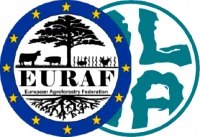 At OLGA, we are now focussing intensively on agroforestry as a sustainable and climate-adapted land use method. Our aim is now to inform farmers about this form of agricultural utilisation, to demonstrate its advantages and ultimately to convince them to implement such a system on their own land. We have also recently been featured on the website of the European Agroforestry Federation (EURAF).
At OLGA, we are now focussing intensively on agroforestry as a sustainable and climate-adapted land use method. Our aim is now to inform farmers about this form of agricultural utilisation, to demonstrate its advantages and ultimately to convince them to implement such a system on their own land. We have also recently been featured on the website of the European Agroforestry Federation (EURAF).
Januar 2024
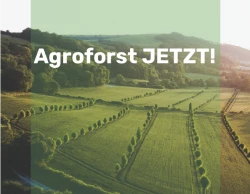 A broad alliance of German agricultural experts and advisors has presented the position paper "Agroforst JETZT!". Agroforestry systems are a multifunctional form of land use in which woody plants are cultivated in combination with agricultural crops and/or livestock.
A broad alliance of German agricultural experts and advisors has presented the position paper "Agroforst JETZT!". Agroforestry systems are a multifunctional form of land use in which woody plants are cultivated in combination with agricultural crops and/or livestock.
The paper emphasises the urgency of establishing agroforestry systems in Germany and demonstrates the huge potential of this form of land use for climate adaptation, the promotion of biodiversity and the (re)revitalisation of agricultural structure (diversity). The brief analysis provides practical advice for governments and administrative bodies on how to strengthen agroforestry and outlines 9 good reasons for scalable and practical agroforestry promotion in Germany.
2024 is to be a year of agroforestry and provide a starting impulse for more agroforestry on our fields in the coming years. Join us and signal your support on the campaign website.
Campaign website (German)
Dezember 2023
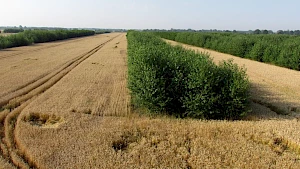
What role can agroforestry play in the future for the regional and decentralized supply of renewable resources? What possibilities are there for further processing and utilization? Where are there already players in Brandenburg and Saxony who are involved in the value chain?
In order to discuss the variety of cooperative relationships between producers and buyers of agricultural timber for the establishment of regional material and value-added cycles, 29 farmers, municipal representatives, entrepreneurs and industry partners interested in agroforestry met with practice-oriented researchers from the AgroWertRegio, Wertvoll and OLGA as well as the German Association for Agroforestry - DeFAF and the Saxon State Office for Agriculture and Geology.
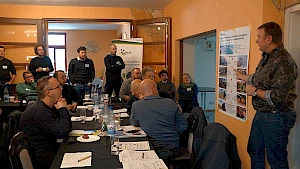
The current strategic plan of the EU's Common Agricultural Policy (CAP) assumes that the area of agroforestry on German fields will be around 200,000 ha by 2026. In December 2023, this figure is currently around 56 ha. So there is still a lot to do: How can we get more agroforestry on the land in the future? To do this, we need courageous and committed farmers, but also - to stay with the wood value chain - municipalities and energy suppliers who buy the wood from farmers and feed it into their local or district heating networks in the form of wood chips.
After introductory presentations on the advantages of agroforestry in general and the legal framework for the establishment and maintenance of agroforestry systems in Brandenburg and Saxony, farmer Thomas Domin and Tobias Peschel from the planting company Lignovis GmbH reported on their practical experience: there are no
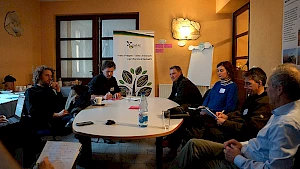
limits to the various cultivation/planting formats and the associated diversification of value creation. They are geared towards the environmental conditions at the location and the economic interests of the farm: whether in strips linked to the farm's own crop rotation, over a large area, as a chicken forest or in coexistence with valuable woods and/or shrub crops - the fast-growing tree species planted for wood use, such as poplar or willow, are very frugal. Once they have been planted, they can bind a lot of CO2 on the potentially available land in Germany and lead it into new cycles. What is needed now is creativity, economic diversification and a little optimism and courage!
Two workshop sessions were held to discuss the framework conditions for establishing a regional value chain for wood from agroforestry and possible opportunities for cooperation in establishing systems, maintenance and wood harvesting. Farmers want security in the form of long-term lease agreements with wood purchase guarantees of up to 15 years. For example, Energy Crops GmbH, a subsidiary of Vattenfall AG, concludes such long-term cooperation agreements with agricultural businesses for Berlin's heat supply.
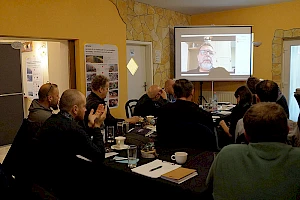
The farmer leases the land and prepares the soil, while Energy Crops assumes the costs and risk for planting, maintenance, harvesting and transportation. In addition to these offers from the industry, a municipality, a local energy company or a cooperative can also work together with agriculture. Thomas Pöge, Mayor of Thallwitz/Wurzener Land, was connected online and explained how multi-use concepts can form the basis for long-term cooperation between municipalities and farmers.
For the future, it is important to clarify that the establishment and use of agroforestry systems is legally regulated by the CAP and that there is nothing to fear if you dare. Agroforestry systems should be understood and communicated as land use systems with numerous advantages and a relatively long lifespan - even beyond the use of wood for energy or material purposes. In addition to the yield benefits, services to promote biodiversity, soil structure and adaptation to climate change play a major role here. With a view to the value chain of wood from agroforestry with fast-growing tree species, municipalities should seek more dialog with their farmers. There is great potential here in terms of a more independent municipal and CO2-neutral heat supply with wood from the field.
November 2023
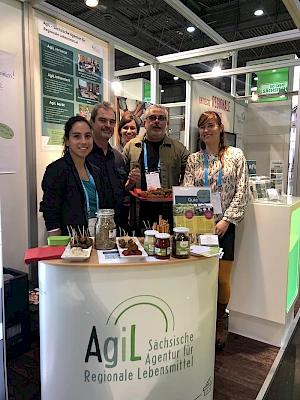 This week, we had the opportunity to present a regional product created by Ali Habiballah from Zaituna Dresden as a prototype at the ISSGUT! fair for the catering and food trade in Leipzig.
This week, we had the opportunity to present a regional product created by Ali Habiballah from Zaituna Dresden as a prototype at the ISSGUT! fair for the catering and food trade in Leipzig.
The falafel balls made from regionally grown lentils by farmer Eckard Voigt from Leisnig near Leipzig even went down well with the meat-oriented visitors ;-). Dipped in Ali's homemade hummus and mildly spicy shattah sauce, the visitors were amazed at the unforgettable Mediterranean taste.
We are delighted to have initiated a short regional value chain for lentil falafel with the OLGA project. From next year, we are initially planning to market the product via organic food retailers in Dresden. We will further act as an intermediary between farmers who want to grow lentils in the region and restaurants or other processing companies that want to integrate lentils or pulses in general into their portfolio.
Many thanks to our colleagues at AgiL -Sächsische Agentur für regionale Lebensmittel for allowing us to use your stand as a stage for this regional premiere.
September 2023
The conference was less about the well-known advantages of agroforestry systems and more about the possibilities and ways in which they can be designed more multifunctionally and cooperatively on the field. We were there and learnt a lot from interesting lectures, posters and talks about the diversity, complexity and resilience that this sensational form of land use brings with it in economic, social and ecological terms.
During three excursions on the first day, the participants visited several example farms in the region that practise regenerative agriculture and produce regional organic products from it. The topics ranged from orchard and timber production to grazing concepts with geese in orchards and sheep in vineyards.
During our visit to the Domäne Hochburg estate, we were able to see for ourselves how well the 340 geese are doing on the 3.4 hectares of meadow orchard where they are allowed to graze during the day. They fertilise the meadow with their droppings, while the trees provide them with shade. The geese gladly accept the offer on this sunny day. The system was originally set up as a conservation garden for old apple varieties, some of which are native, such as the "Aujäger" or the "Ulmer Polizeiapfel". The apples are processed into partly varietal juices and sold ex farm via vending machines and in shops in the surrounding area. The goose meat is offered in cooperation with a small slaughterhouse in the neighbouring village for St. Martin's Day and Christmas. A goose can reach an average slaughter weight of 5 kg (!).
In addition to the breathtaking view from the Staatsweingut Freiburg, our second excursion stop, of the Rhine plain, the Vosges and the vineyards of the Kaiserstuhl, we were particularly impressed by the sheep running around among the vines. This was a trial site of the research project "Win-win in the vineyard" of the Rottenburg University of Applied Sciences. The aim is to revitalise historical extensive forms of use while at the same time increasing land efficiency due to dual use and regional value creation of not only wine but also wool and meat in a land use system. The sheep also act as "lawn mowers" and keep the vines free of unwanted shoots, weeds and the grape zone. Last but not least, this form of multiple use provides environmental services such as microhabitats, soil building and erosion control.
After a joint dinner and conclusion of the first with plenty of exchange and networking, the second conference day started with a presentation by Dr. Ravi Prabhu, Vice Director of the international agroforestry NGO CIFOR-ICRAF. He brought some examples of uplifting and community-based agriculture in his home country India. Prabhu predicted that without the agroecological transformation of the "big framework", namely the policy and support structures, no real regeneration of the respective national land use systems could be expected either. Prof. Klein from the University of Freiburg then spoke about the reaction of bees to pesticide-contaminated plants during pollination. Flowering strips that are as diverse as possible along rows of trees or in their undergrowth are important elements for promoting the biodiversity of agroforestry systems. At the end of the plenary session, Jan Große-Kleinmann, a convinced young farmer, shared his practical experience with the establishment of an agroforestry system on his farm in Münsterland. In the further course of the forum, the visitors were able to learn about practical experiences with implementation, political and legal (funding) strategies, education and knowledge transfer as well as the ecosystem services of agroforestry systems in four expert sessions.
Agroforestry had a big stage in Freiburg! We will take home enriching discussions, new impulses and contacts for the promotion of this regenerative land use in Saxony and Central Germany. Thank you to all organisers and participants who made this exchange on this platform possible!
August 2023
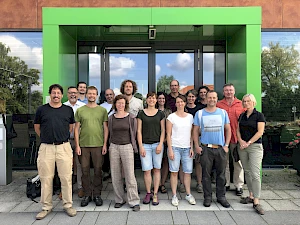 Have you ever heard of IANS? The abbreviation stands for Interdisciplinary Agroforestry Network Saxony, whose constituent meeting took place on 16th of August 2023 in Nossen at the Competence Centre for Organic Farming of the Free State of Saxony. An interdisciplinary group of 16 people discussed the tasks, thematic starting points and competences that the network can initially provide. The future role of the working group is to provide information, networking and advice to interested farms and communities that are thinking about and can imagine establishing and managing an agroforestry system. We are pleased to be part of the network with OLGA and to join forces in supporting agroforestry in Saxony. More information about the network's activities, outreach and effects will follow!
Have you ever heard of IANS? The abbreviation stands for Interdisciplinary Agroforestry Network Saxony, whose constituent meeting took place on 16th of August 2023 in Nossen at the Competence Centre for Organic Farming of the Free State of Saxony. An interdisciplinary group of 16 people discussed the tasks, thematic starting points and competences that the network can initially provide. The future role of the working group is to provide information, networking and advice to interested farms and communities that are thinking about and can imagine establishing and managing an agroforestry system. We are pleased to be part of the network with OLGA and to join forces in supporting agroforestry in Saxony. More information about the network's activities, outreach and effects will follow!
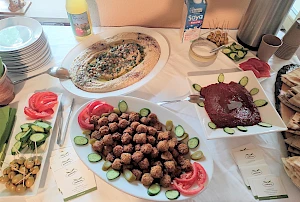
In Kooperation mit NAHhaft e. V. haben wir Anfang Juli 2023 mit Köchinnen und Köchen aus der Kita- und Schulverpflegung leckeres aus Hülsenfrüchten gekocht und uns darüber unterhalten, wie diese noch stärker Eingang in die Kita- und Schulverpflegung finden können und warum das bisher noch nicht passiert ist. Im August-NAHhaft-Newsletter hat unsere Kollegin Lene Frohnert einen Artikel über den Verlauf und die Ergebnisse des Workshops verfasst, den wir hier mit Euch teilen möchten: Bio kann jeder - Kochpraxis mit Hülsenfrüchten in der Kita- und Schulverpflegung
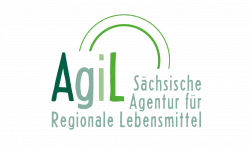 Sie möchten Ihre Produkte an Großküchen in der Region liefern? Sie bieten als (Groß-)Händler ein Regionalsortiment, das bisher nur wenige Kantinen kennen? Ihre regionalen Produkte sind bereits lange in der Gemeinschaftsverpflegung im Einsatz? Dann beteiligen Sie sich bis 15.09.2023 an der Umfrage der Sächsischen Agentur für Regionale Lebensmittel (AgiL) zu regionalen Lieferstrukturen für Gemeinschaftsverpflegung in Sachsen.
Sie möchten Ihre Produkte an Großküchen in der Region liefern? Sie bieten als (Groß-)Händler ein Regionalsortiment, das bisher nur wenige Kantinen kennen? Ihre regionalen Produkte sind bereits lange in der Gemeinschaftsverpflegung im Einsatz? Dann beteiligen Sie sich bis 15.09.2023 an der Umfrage der Sächsischen Agentur für Regionale Lebensmittel (AgiL) zu regionalen Lieferstrukturen für Gemeinschaftsverpflegung in Sachsen.
Juli 2023
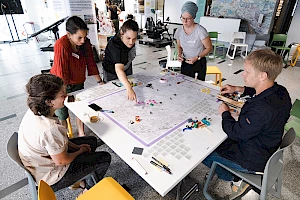
Last week we developed visions for a regional legume value chain in Dresden and Saxony in 2045 together with people who are committed to a sustainable and regional agriculture and food economy. In terms of content, we moved between existing social, technical, economic, environmental and political problems in designing the value chain, and concerns, hopes and wishes of the actors, as well as their relationships and dependencies on each other.
On the basis of these findings and the participants' evaluation of given future scenarios on cultivation conditions, processing, distribution and the social value of pulses, we developed two future visions for a functioning value chain for pulses using a map of the Dresden region and Lego Serious Play.
Model and experimental farms distributed throughout the region and a coordinated integration of diverse varieties into the crop rotation form the basis for a year-round regional supply of pulses in 2045. Canteens, restaurants and private households benefit from consumer-oriented marketing forms in the city - from the farm shop, subscription box, food hub and 24/7 pick-up boxes to the vegetable stall at the weekly market! These are equipped with a CO2-neutral sophisticated logistics system "Farm2Fork". Research, education and communication about the ecological, climate and nutritional value of legumes is happening on a grand scale. Legumes are (again) an integral part of our regional diet!
We would like to thank Lenard and the Chair of Technical Design at TU Dresden for the opportunity to organise a workshop at the COSMO Science Forum. It was a great experience and lots of fun! We really enjoyed the delicious finger food made with pulses and love by the Palais Café.
What is the importance of pulses for you? How often a week do you enjoy them - as a dried whole fruit or processed into spreads, meat substitutes, vegetable drinks, etc.? Would you like to see a future with more legume products? If so, which would you prefer? Write us your thoughts: projekt-olga@dresden.de!
Photos: Lenard Opeskin, Anke Hahn
Juni 2023
The OLGA project is funded by the Federal Ministry of Education and Research within the framework of the Urban-Rural-Plus Directive. In addition to the topic of sustainable land use and regional value creation, there are also projects on spatial and settlement development, regional material cycles, etc. within this funding framework. Once a year, the entire Stadt-Land-Plus community meets for a status conference - this time on 12 and 13 June 2023 in Bamberg. There, a look was taken at the results of the projects of the first funding call of this guideline, which were already launched in 2018 and are now coming to an end.
The event was generally held under the motto of equitable urban-rural relations and asked, among other things, whether the country per se was the loser and the city the winner of all developments. Regional planner and legal scholar Ben Davy gave an interesting keynote on regional (in)justice.
In the thematic cluster "Regional Products", we discussed the results and pilot measures with our colleagues: In the Leipzig region, it quickly became clear that a further refinement step was needed in processing when supplying communal catering with products from the region, because the large company canteens, for example, only take peeled potatoes. There is still a need for optimisation in the value chain. On the basis of the marketing platform for regional products regiothek.de, the Nuremberg Metropolitan Region makes the supply relationships of food producers, processors and end consumers transparent. In a regional context, suggestions for transport bundling are calculated and proposed to the businesses in order to save distances and ultimately CO2.
All funded projects were also called upon to name legal obstacles from their (research) work of the last few years that essentially hinder spatial (urban-rural) developments or make them impossible in the first place. Due to the fact that agricultural land in conurbations is increasingly dwindling due to other uses, it was suggested that these cultivated areas should be legally secured. In addition, climate protection should become a compulsory municipal task in the future and the criterion of "regionality" should be included in public procurement law. After the expert presentations, networking and exchange with the other project actors from administration, science and practice continued in the evening over a drinkable Bamberg beer.
On the second day, we explored the Knoblauchsland, one of the largest contiguous vegetable growing areas (approx. 385 ha in the open and approx. 30 ha under glass) in Bavaria between Nuremberg, Erlangen and Fürth, on one of four excursions on the topic of (urban) agriculture and horticulture. We visited a farm for the production of organic herbs and vegetables and the organic producers' cooperative Franken-Gemüse, which bundles and markets the products of 50 Knoblauchsland farms. All in all, it was a successful event that was superbly organised by the colleagues from the cross-sectional project Stadt-Land-Plus. Many thanks for that!
Mai 2023
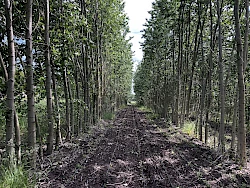 It is now widely recognized that agroforestry can make a significant contribution to the design of sustainable land management. However, support for agroforestry systems within the framework of agricultural subsidies in Germany is still not enough. For this reason, the professional associations Arbeitsgemeinschaft bäuerliche Landwirtschaft e.V. (AbL) and Bund Ökologische Lebensmittelwirtschaft e.V. (BÖLW), together with the Deutscher Fachverband für Agroforstwirtschaft e.V. (German Association for Agroforestry), have written an open letter to the ministers and senators for agriculture and the environment of the federal and state governments. With a total of 99 co-signing associations and institutions, the letter shows broad agreement with the demands formulated in the letter, which relate, among other things, to the currently existing bureaucratic hurdles such as the utilization concept and distance regulations.
It is now widely recognized that agroforestry can make a significant contribution to the design of sustainable land management. However, support for agroforestry systems within the framework of agricultural subsidies in Germany is still not enough. For this reason, the professional associations Arbeitsgemeinschaft bäuerliche Landwirtschaft e.V. (AbL) and Bund Ökologische Lebensmittelwirtschaft e.V. (BÖLW), together with the Deutscher Fachverband für Agroforstwirtschaft e.V. (German Association for Agroforestry), have written an open letter to the ministers and senators for agriculture and the environment of the federal and state governments. With a total of 99 co-signing associations and institutions, the letter shows broad agreement with the demands formulated in the letter, which relate, among other things, to the currently existing bureaucratic hurdles such as the utilization concept and distance regulations.
Press release of DeFAF e. V. (German)
Direct link to the letter (German)
 With an intense smell of rapeseed in the air and a skylark concert, we were active in spring sunshine on the land of farmer Marion Herrmann in Sieglitz near Lommatzsch to rid some trees of weeds in the agroforestry system planted before Easter.
With an intense smell of rapeseed in the air and a skylark concert, we were active in spring sunshine on the land of farmer Marion Herrmann in Sieglitz near Lommatzsch to rid some trees of weeds in the agroforestry system planted before Easter.
Five parallel strips were planted, each consisting of five rows of trees. The outer two strips were planted with four different performance varieties, which are now being analyzed in the growth process. The varieties planted were "Vesten" (Populus deltoides x P. nigra), "Bakan" (P. trichocarpa x P. maximowiczii), "Dender" (P. deltoides x (P. trichocarpa x P. maximowiczii) and "Matrix 11" (P. maximowiczii x P. trichocarpa). These fast-growing tree stands can be used for regional energy as well as raw material production after a several years growing season. The middle single strip was planted with wild cherry/bird cherry (Prunus avium ssp. avium), Norway maple (Acer platanoides), and littleleaf linden (Tilia cordata). These deciduous hardwoods are used for long-term cultivation for the production of valuable timber, which can be sold to the timber industry as veneer or solid wood after about 40-60 years.
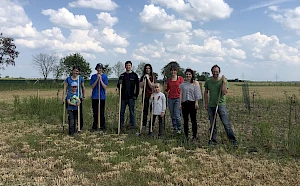 The task in this work assignment was to clear the value timber stands of regrown weeds around the plantings. Removing them by hand with a hoe was a tough job in the dry clay soil, but with combined efforts it went faster than expected! Probably there will be a second weed control action in spring, after that it will be no longer necessary and the trees are big enough.
The task in this work assignment was to clear the value timber stands of regrown weeds around the plantings. Removing them by hand with a hoe was a tough job in the dry clay soil, but with combined efforts it went faster than expected! Probably there will be a second weed control action in spring, after that it will be no longer necessary and the trees are big enough.
Thanks to the organizers BUND Dresden and Landwirtschaftsbetrieb Herrmann! We were glad to be there!
April 2023
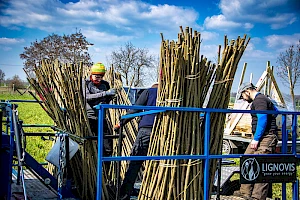 There are trees on the fields of the Lommatzscher Pflege (again) - at least they are initially rods, which should already be small trees in the fall. One farm in Sieglitz near Lommatzsch has opted for an agroforestry system on its land. And this is just the beginning! OLGA, in cooperation with farmer Marion Herrmann, the Stadt-Land-Plus 'sister project' WertVoll, the biotope network project of BUND Dresden, and the agroforestry or permaculture experts for fast-growing tree species Lignovis GmbH and Nam Nam Natura, has made short work of creating the foundations for an agroforestry system with energy and value woods.
There are trees on the fields of the Lommatzscher Pflege (again) - at least they are initially rods, which should already be small trees in the fall. One farm in Sieglitz near Lommatzsch has opted for an agroforestry system on its land. And this is just the beginning! OLGA, in cooperation with farmer Marion Herrmann, the Stadt-Land-Plus 'sister project' WertVoll, the biotope network project of BUND Dresden, and the agroforestry or permaculture experts for fast-growing tree species Lignovis GmbH and Nam Nam Natura, has made short work of creating the foundations for an agroforestry system with energy and value woods.
The agroforestry plantation in Sieglitz involves five parallel strips, each consisting of five rows of trees. The outer two strips were planted with four different performance varieties, which are now being analyzed in the growth process. The varieties planted were "Vesten" (Populus deltoides x P. nigra), "Bakan" (P. trichocarpa x P. maximowiczii), "Dender" (P. deltoides x P. trichocarpa x P. maximowiczii) and "Matrix 11" (P. maximowiczii x P. trichocarpa). These fast-growing tree stands can be used for regional energy as well as raw material production after a short multi-year growing season. The middle single strip was planted with wild cherry/bird cherry (Prunus avium ssp. avium), Norway maple (Acer platanoides), and littleleaf linden (Tilia cordata). These deciduous hardwoods are used for long-term cultivation for the production of valuable timber, which can be sold to the timber industry as veneers or solid wood after about 40-60 years.
This agroforestry crop was planted with a strip spacing of 72 m in a north-south orientation in order to significantly reduce wind erosion, improve the water balance, keep the shadows cast on the arable crops low and at the same time secure the yield in the crop rotation, especially in dry years. Wood production creates another branch of the business, which improves the diversification of the farm. This is a successful example of the combination of biodiversity, structural upgrading of agricultural land and a regional value-added option for farmers. This cultural landscape development voluntarily links agriculture with applied, production-integrated conservation - a good way to go.
We will continue to follow the development of the system and communicate the benefits of agroforestry use in Saxony in cooperation with all stakeholders - for example, by showing other farmers on site in Sieglitz how it can be done. We are staying tuned!
Fotos: Victor Smolinski
Ab sofort können Interessierte an einer Online-Umfrage zur Bewerbung Dresdens für die Bundesgartenschau (BUGA) 2033 teilnehmen. Akteure, Institutionen sowie Bürgerinnen und Bürger sind eingeladen, bis Sonntag, 23. April 2023, Rückmeldungen zu einer ersten Ideenskizze zu geben sowie eigene Wünsche und Vorstellungen einzubringen.
März 2023
Das Zentrum für Angewandte Forschung & Technologie an der Hochschule für Technik und Wirtschaft Dresden schreibt eine Stelle in Vollzeit (40 h/Woche, 100%) oder in Teilzeit für das Bündnis DMPL (Diversitäts-Management und neue Prozessqualität für nachhaltige Landwirtschaft und regionale Wertschöpfung) aus. DMPL etabliert ein nachhaltiges Netzwerk von Akteuren entlang landwirtschaftlicher Wertschöpfungsketten und entwickelt dabei ein neuartiges Management in Bezug auf Strategieentwicklung, Innovationsförderung und Projektbegleitung.

Both organic and conventional farms can now apply to participate in the LeguNet project at the Saxon State Office for Environment, Agriculture and Geology. By participating, you agree to take on the demonstration cultivation of a grain legume and to deal with technical production issues. The aim is to optimise your own cultivation method and to impart knowledge on the subject. Experienced and interested farms in legume cultivation thus benefit directly from the specific expertise of other farms. The website www.legunet.de already provides information about the project and the cultivation of legumes.
LeguNet is the "model demonstration network for expanding and improving the cultivation and utilisation of grain legumes in Germany". It combines three previous networks on pea/bean, soya and lupine of the nationwide protein crop strategy. The aim is to increase the cultivation and utilisation of legumes in Germany. In particular, the focus is on processing and marketing of field bean, pea, soya and lupin. Still rare but increasingly interesting species such as chickpea or lentil are also considered.
Learn more (in German)
Februar 2023
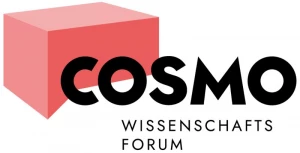 The COSMO Science Forum invites you to the launch event of the new exhibition on the topic of "What is Sustainability?" on 15th of March at 17:00.
The COSMO Science Forum invites you to the launch event of the new exhibition on the topic of "What is Sustainability?" on 15th of March at 17:00.
What does climate change mean for us locally? Are our trees in the forests and parks dying now?
Sustainable food for all - is that even possible? How can we bring together efficient food production and a healthy ecosystem?
How do we want to change our cities? Can they become more environmentally friendly and at the same time more equitable?
In short, how can we make our way of life sustainable and more liveable?
Scientists from Dresden, including those involved in the OLGA project, have been researching the topic of sustainability for years and are now using more than ten exhibits to show possible solutions to these and other pressing questions of our time at the COSMO Science Forum from mid-March to mid-July. The topics range from biodiversity, climate change and environmental protection to recycling, sustainable urban development and education to agriculture and nutrition. In addition to vivid models, interactive virtual reality installations and displays as well as videos will be on show. The exhibition will be accompanied by a variety of events over the coming months.
The opening event on 15th March 2023 at 17:00 will kick things off and all interested people are cordially invited to attend.
Flyer (German)
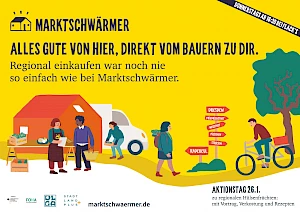 Starting on 10 February, just in time for the International Legume Day, the OLGA project invited people to immerse themselves in the world of beans, peas, lentils and lupins at the Marktschwärmer stations in Radebeul, Dresden-Pieschen, -Neustadt and -Friedrichstadt.The aim was to educate the Marktschwärmer customers about the agricultural and health benefits of pulses and, above all, to arouse enthusiasm for incorporating them into their daily cooking. To taste, there was a guacamole with a guaranteed low carbon footprint made from green peas, chocolatey-creamy brownies made from field beans or a German classic, the Hefezopf (yeast plait), in whose dough, however, a considerable amount of lupins had crept in ;-). Many customers stopped and took away inspirations and recipes. There was a great demand for very practical questions: What is the best way to soak? Which pulses are suitable for which dishes? How can pulses be better integrated into everyday life without much effort? Where can I buy (regional) pulses?
Starting on 10 February, just in time for the International Legume Day, the OLGA project invited people to immerse themselves in the world of beans, peas, lentils and lupins at the Marktschwärmer stations in Radebeul, Dresden-Pieschen, -Neustadt and -Friedrichstadt.The aim was to educate the Marktschwärmer customers about the agricultural and health benefits of pulses and, above all, to arouse enthusiasm for incorporating them into their daily cooking. To taste, there was a guacamole with a guaranteed low carbon footprint made from green peas, chocolatey-creamy brownies made from field beans or a German classic, the Hefezopf (yeast plait), in whose dough, however, a considerable amount of lupins had crept in ;-). Many customers stopped and took away inspirations and recipes. There was a great demand for very practical questions: What is the best way to soak? Which pulses are suitable for which dishes? How can pulses be better integrated into everyday life without much effort? Where can I buy (regional) pulses?
On the occasion of the campaign, colourful beans from Bavaria and chickpea snacks from Halle could be pre-ordered. In the longer term, however, the only place to buy regionally grown pulses is at the Dresdner Verbrauchergemeinschaft. We from the OLGA project would like to change that in the future. During the tasting campaign, a total of 40 Marktschwärmer customers were asked about their attitude towards buying pulses. About 65% could imagine eating pulses more often if they were grown locally. Lentils and peas are particularly popular.
Delicious recipes with pulses (only German).
Am Mittwoch, den 08.02.2023 veranstaltet das DMPL-Bündnis von 09.30 - 16.00 Uhr ein Innovations-Forum zum Thema Körnerleguminosen in Sachsen, unter dem Motto: "Power-Eiweiß aus Sachsen". Dabei wird es eine Mini-Messe mit verschiedenen Ausstellern entlang der gesamten Wertschöpfungskette geben. lmpulsvorträge und Workshops - vom Anbau, über die Verarbeitung, bis zum Handel - dienen dazu miteinander ins Gespräch zu kommen und Problemfelder sowie Lösungsmöglichkeiten auszuloten. Das Projekt OLGA wird als Impulsgeber und Vernetzer im Bereich regionale Wertschöpfung mit Hülsenfrüchten mit einem Infostand vor Ort präsent sein.
Januar 2023
 Kann man mit Hülsenfrüchten eigentlich auch Kuchen backen? Wer probieren will, wie das schmeckt, ist herzlich eingeladen, zu den Marktschwärmereien in Dresden und Umgebung zu kommen und sich zu informieren. Wir erwarten Euch an unserem Pop-up-Stand zu regionalen Hülsenfrüchten am
Kann man mit Hülsenfrüchten eigentlich auch Kuchen backen? Wer probieren will, wie das schmeckt, ist herzlich eingeladen, zu den Marktschwärmereien in Dresden und Umgebung zu kommen und sich zu informieren. Wir erwarten Euch an unserem Pop-up-Stand zu regionalen Hülsenfrüchten am
Donnerstag, 26.01.2023, 16:30 bis 18:00 Uhr in Radebeul, Hoflößnitzstr. 3 (Flack's)
Freitag, 03.01.2023, 16:00 bis 17:00 Uhr in Dresden-Pieschen, Gehestr. 8 (GEH8)
Dienstag, 07.02.2023, 17:30 bis 19:00 Uhr in Dresden-Neustadt, Görlitzer Str. 35, Hinterhof
Donnerstag, 09.02.2023, in Dresden-Friedrichstadt, Wachsbleichstr. 4a (riesaefau)
Dort machen wir eine kleine Verkostung mit Produkten aus Hülsenfrüchten und erzählen, warum Bohne & Co. so entscheidende Elemente für eine gesunde Landwirtschaft und Ernährung sind.
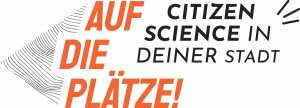 Mit dem Wettbewerb fördern das Museum für Naturkunde Berlin und Wissenschaft im Dialog Ideen, die Bürger:innen zum Mitforschen einladen und die Vernetzung von lokalen Akteur:innen aus den Bereichen Wissenschaft, kommunale Verwaltung und Zivilgesellschaft in den Fokus nehmen. Vom 1. Februar bis 24. März 2023 können Ideenskizzen eingereicht werden. Drei Preisträger:innen erhalten jeweils 50.000 Euro, um ihre Citizen-Science-Ideen ab Herbst 2023 auf die Plätze zu bringen.
Mit dem Wettbewerb fördern das Museum für Naturkunde Berlin und Wissenschaft im Dialog Ideen, die Bürger:innen zum Mitforschen einladen und die Vernetzung von lokalen Akteur:innen aus den Bereichen Wissenschaft, kommunale Verwaltung und Zivilgesellschaft in den Fokus nehmen. Vom 1. Februar bis 24. März 2023 können Ideenskizzen eingereicht werden. Drei Preisträger:innen erhalten jeweils 50.000 Euro, um ihre Citizen-Science-Ideen ab Herbst 2023 auf die Plätze zu bringen.
As part of the analysis of the microclimatic effects of agroforestry structures on neighbouring watercourses, we have also worked in OLGA on monitoring the habitat change of microorganisms in the watercourse - the so-called macrozoobenthos. At the end of 2022, a scientific article entitled "Development of transient habitat modelling for stream macrozoobenthos" was published in English at the Institute of Hydraulic Engineering and Technical Hydromechanics at TU Dresden.
Dezember 2022
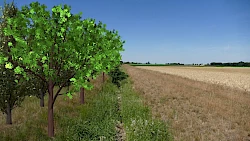
The BUND Regional Group Dresden is carrying out the project Multifunctional Biotope Network (in German) until June 2023. An agroforestry strip is to be established at the edge of watercourses in the surrounding area of Dresden (neighbouring districts). For this measure, the project is still looking for a farmer who is interested in establishing a pilot site.
Learn more (in German)
November 2022
For the period 2023-2024, the KOPOS project is looking for one model project in each of the Berlin-Brandenburg and Freiburg im Breisgau regions that will use a sustainable approach to practically test concepts for a sustainable and regional food supply based on principles of cooperation. The best project idea in each region will be awarded 100,000 euros.
The funding programme Stadt-Land-Plus, in which the OLGA project also runs, reports in its 13th newsletter on the news from the individual project clusters and the world of settlement, land and rural development & regional value creation in urban and rural areas.
Newsletter (German only)
Oktober 2022
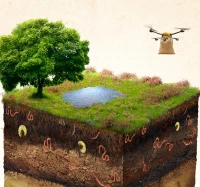
With its small project fund, the Bio Planète Ölmühle Moog GmbH wants to promote innovative and sustainable action for healthy soils, biodiversity and sustainable agriculture. Projects up to a maximum of € 10,000 and with an implementation between autumn 2022 and the end of 2023 are supported.
September 2022
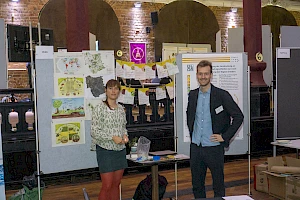
After three years of Corona online meetings, all participants were finally able to meet and exchange ideas in person at the Felsenkeller in Leipzig on the 19th and 20th of September 2022. At the "Marketplace of Opportunities", all initiatives presented themselves, shared their results and synergies. There were also one or two good tips for the OLGA team. For example, in some federal states agroforestry systems can be implemented as a production-integrated compensation measure. Maybe also an option for Saxony?! One stand showed the steps needed to produce activated carbon pellets from green and landscape cuttings. That can also be done with agriwood, can't it? From other projects we learned how to carry out agricultural reallabs or how "tiny gardens" look like.
For the continuation of processes, cooperations and reallabs etc. in cities and regions, it is important to think about legal regulations, planning guidelines and horizons, and to find people who think regionally and are committed to their topics and projects beyond the boundaries of municipal or city administrations. During the implementation phase of OLGA, we will make sure to have a regular exchange with actors in Dresden and the surrounding area so that our pilot measures and agricultural reallabs can be continued.
Field trip about regional food value chains in the Leipzig region
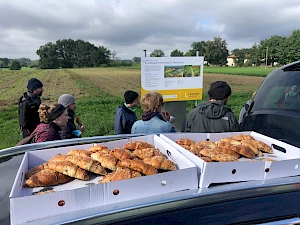
On the second conference day there were four thematic excursions to choose from. We took the one dealing with regional products - of course - and spoke to people who are committed to regional food value creation in Leipzig and the surrounding area:
Thilo Egenberger sells mostly regional and organic food in the Plagwitz market hall - this is also where the refreshingly sour "lipz Schorle" was created. The City of Leipzig is currently developing a comprehensive cross-sector strategy for regionally sustainable food. Lots of municipal instruments are involved in this process, such as studies, leasing criteria, regional marketing, nutrition education, etc.
Johanna and Robert at the Lerchenhof in Jesewitz gave us an insight into a regenerative farm. Soon they will start up an organic mill for processing regional cereals and legumes (!). Lastly, we stopped at Wassergut Canitz GmbH to see an example of a valuable urban-rural cooperation for the production, processing and marketing of regional organic food (potato and onion!) in the drinking water protection area of Leipzig.
Four municipalities in the Wurzen region want to promote regional material and product cycles. To this end, they founded the Wurzener Landwerke. Here, four inter-municipal companies have already been established for the tasks of digitalisation, energy, service and regional food.
Thank you to the WERTvoll project team for organising the excursion and to all the speakers! It was great fun with you!
Regional legumes as vegetable protein suppliers are a key component for climate-friendly nutrition and agriculture. On 5th of October 2022 from 13:30-17:30, the association Nahhaft e.V. and the OLGA project are offering a workshop for catering managers in school and daycare canteens in the Dresden region.
This year we were part of this year's Kraftwerk Mitte Fest, the cultural festival in the centre of Dresden. With a joint stand with Europe Direct Dresden and Europa-Union Sachsen, two initiatives that are also based at the Umweltzentrum, we specialised in the topic of pulses at this festival, because we want more people in Dresden and the region to realise that peas, beans, lupins, lentils & co. are tasty, contribute to a healthy diet and protect the climate.
At our stand, many people learned about the use of pulses and took away great recipe ideas for pea guacamole or field bean brownies, for example. We immediately offered the brownies for tasting, which were especially popular with the children compared to the soy and lupine tempeh samples we offered on behalf of Umani Kulturgut from Leipzig. It was rather the adults who stayed there and marvelled: that doesn't taste bad at all. The interest in pulses as a protein supplier and meat-free alternative in human nutrition is also growing in Dresden. We are happy!
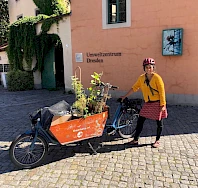
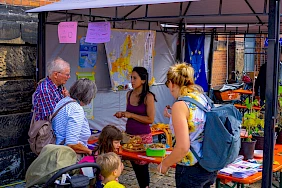
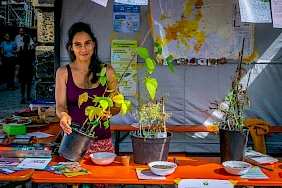
Photos: Anke Hahn (links), Victor Smolinski
August 2022
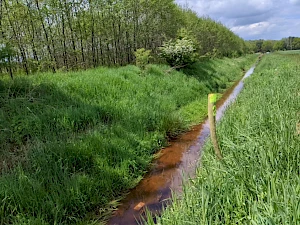 The OLGA test area at farmer Thomas Domin's in Peickwitz in southern Brandenburg became the setting for a mdr feature on agroforestry this summer. Manuel Wewer from the Institute of Hydraulic Engineering and Thermal Hydromechanics at the TU Dresden explains from minute 6:20 the technology installed in and around the Peickwitz millrace to measure water temperature, water level, air temperature, humidity and pressure as well as wind speed and solar radiation. The measurement results provide information about the shading effect of the adjacent agricultural wood structure on the watercourse.
The OLGA test area at farmer Thomas Domin's in Peickwitz in southern Brandenburg became the setting for a mdr feature on agroforestry this summer. Manuel Wewer from the Institute of Hydraulic Engineering and Thermal Hydromechanics at the TU Dresden explains from minute 6:20 the technology installed in and around the Peickwitz millrace to measure water temperature, water level, air temperature, humidity and pressure as well as wind speed and solar radiation. The measurement results provide information about the shading effect of the adjacent agricultural wood structure on the watercourse.
Juli 2022
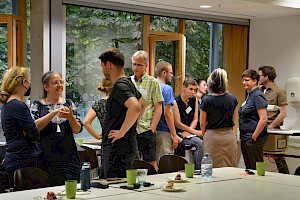
It has been talked about for a long time, now at the end of June it came to the first "Come Together": Stakeholders from the City of Dresden and the TU Dresden met at the latter for the workshop "What's sustainable in Dresden?" as part of the TUD Sustainability Week. The meeting was organised by the Green Office of TU Dresden and Zukunftsstadt Dresden, which has been funded by the Federal Ministry of Education and Research since 2015 and has so far produced a number of sustainable citizens' projects and initiatives. During the moderated exchange over coffee and cake, a number of synergies between TU institutions and the municipal departments emerged with regard to the sustainable development of Dresden and the overall social transformation in the city. Although both institutions have already worked together on individual projects in the past, the need for stronger and more permanent cooperation was felt again and again. Topics that were addressed in this context and could play a role in the future between science and administration were:
- Climate-neutral and smart city 2030
- Consideration of climate protection in the renovation of buildings, e.g. vegetation and photovoltaics on roofs
- Sustainable equipment for events
- Knowledge transfer in the development of sustainability strategies and integrated climate protection concepts
- Inclusion and participation
- Regional and climate-adapted agriculture and food system
- Education for sustainable development
- Protection of biodiversity and development of urban nature
OLGA was also present at the exchange. We made contacts to promote research and development on sustainable approaches to land management and food habits (regional, seasonal, climate-adapted!) in the region and to raise awareness for regional value creation in agriculture and food in general. At TU Dresden, there are already initiatives in this regard for more regional communal catering in the TU canteens and the stronger integration of educational offers for sustainable development in the area of agriculture and nutrition for students, e.g. directly on a campus-owned agricultural practice and experimentation area. All participating projects and initiatives were able to present themselves in the form of a project stand. We didn't need to be told twice and turned our OLGA info point into a tasting stand for mini-breads made from regional field bean flour with at least locally prepared field bean and lupine hummus with lots of information about the nutritional value and the climate balance of pulses for the stand visitors.
The networking process between administration and science will already be continued beginning of September at a second "sustainability" meeting.
Juni 2022
The Südpark area in Dresden is currently being developed into a landscape park with multifunctional use (agriculture, nature conservation, leisure, meeting places, gardening, etc.). It is to become a park for the people living here. Since we in OLGA are concerned with sustainable land use and food production, processing and consumption in urban and rural spaces, we are of course also interested in a sensible agricultural use of the park.
We used our team meeting today to make a site visit by bike to Südhöhe to see what can happen there in the next years. There are a few ideas for land use on the slightly sloping site. An urban farming concept with cooperation partners seems most attractive to us at the moment. Currently, the agricultural land designated by the development plan is just maize. We will make sure that the land use will get more multifunctional, diverse and colourful up there in the future. So stay tuned for what we will come up with to make urban agriculture tangible and communicable!
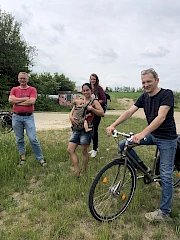
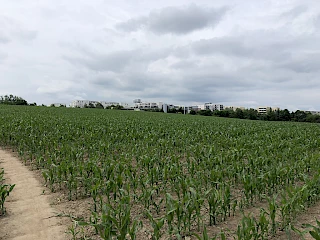
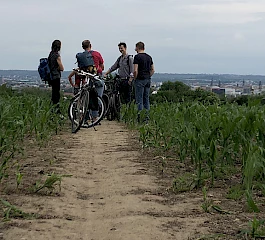
Mai 2022
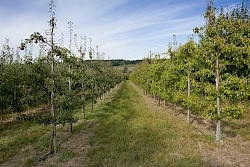
Das Bundesministerium für Ernährung und Landwirtschaft (BMEL) beabsichtigt, Modell- und Demonstrationsvorhaben (MuD) im Rahmen eines Aufrufs zum Thema „Zukunftsfähige Landwirtschaft mit Agroforstsystemen“ zu fördern. Die Förderung erfolgt über das Förderprogramm „Nachwachsende Rohstoffe“ (FPNR) und untersetzt den Förderschwerpunkt „Entwicklung von Konzepten für eine nachhaltige Erzeugung und Verwertung nachwachsender Rohstoffe unter besonderer Berücksichtigung der Ressource Wasser“.
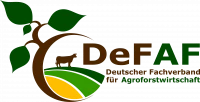 Within the framework of the Agroforestry Academy initiated by German Association for Agroforestry (DeFAF), extensive further training courses on agroforestry are taking place for the first time this year. The new website of the Agroforestry Academy is now online and provides information on the background and offers of the Academy. For the time being, two courses will be held this year: an agroforestry practical course for agricultural practitioners and an agroforestry planning course for advisors from the agricultural sector. It is planned to hold the courses annually. Up-to-date information will be available on the new website of the Agroforestry Academy. If you are already interested in participating in one of the two courses next year, you can contact the Agroforestry Academy team directly: www.agroforst-akademie.de (in German)
Within the framework of the Agroforestry Academy initiated by German Association for Agroforestry (DeFAF), extensive further training courses on agroforestry are taking place for the first time this year. The new website of the Agroforestry Academy is now online and provides information on the background and offers of the Academy. For the time being, two courses will be held this year: an agroforestry practical course for agricultural practitioners and an agroforestry planning course for advisors from the agricultural sector. It is planned to hold the courses annually. Up-to-date information will be available on the new website of the Agroforestry Academy. If you are already interested in participating in one of the two courses next year, you can contact the Agroforestry Academy team directly: www.agroforst-akademie.de (in German)
Food systems must ensure a balanced diet for all people. But how can we produce food in an environmentally and socially responsible way? What developments and innovations does the future hold? This is what the National Dialogue is about.
Do you have ideas or suggestions?
Do you know of working examples or scalable solutions?
Share your thoughts with us and get involved!
Du interessierst Dich für die Themen Landwirtschaft, Ernährung und nachhaltige Landnutzung und hast Lust, in einem bundesweit vernetzten Forschungs- und Entwicklungsprojekt mitzuwirken? Dann bewirb Dich bis 18. Mai 2022 bei uns. Mehr Informationen zu den Stellenanforderungen und Konditionen findest Du in der Stellenausschreibung.
April 2022
Solidarity Farming (SoLawi) is an innovative model for a sustainable, regional food supply. While consumers are supplied with good food all year round, this type of producer-consumer community provides agricultural businesses with planning security and fair wages.
Agraset Agrargenossenschaft eG in Saxony shares this view, which is why it would like to transfer land to a SoLawi. For this, committed gardeners and consumers are needed to promote the establishment of a SoLawi on this land. All interested parties are invited to an information event on 27th of April 2022 in Erlau.
More information (in German)
März 2022
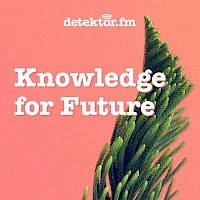 Have you heard the podcast "Knowledge for Future"? Our colleagues from the Stadt-Land-Plus-project KOPOS work together with detektor.fm and look at smart ideas that could make the world a little better. How can it be financed? And how can politics take a sustainable path into the future? One focus is of course on the food revolution, how we can produce and consume more sustainably and regionally.
Have you heard the podcast "Knowledge for Future"? Our colleagues from the Stadt-Land-Plus-project KOPOS work together with detektor.fm and look at smart ideas that could make the world a little better. How can it be financed? And how can politics take a sustainable path into the future? One focus is of course on the food revolution, how we can produce and consume more sustainably and regionally.
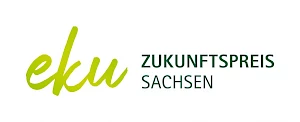 Also in 2022 the "eku - Zukunftspreis für Energie, Klima, Umwelt" is going into the 3rd round! With this prize, the Saxon State Ministry for Energy, Climate Protection, Environment and Agriculture (SMEKUL) would like to support and make visible Saxony's commitment to the transformation towards a sustainable and climate-neutral society.
Also in 2022 the "eku - Zukunftspreis für Energie, Klima, Umwelt" is going into the 3rd round! With this prize, the Saxon State Ministry for Energy, Climate Protection, Environment and Agriculture (SMEKUL) would like to support and make visible Saxony's commitment to the transformation towards a sustainable and climate-neutral society.
Entrepreneurs, scientists, municipalities, committed civil society and especially children and young people can participate. Applications with project ideas and/or successfully implemented projects can be submitted online from today until 28th of April 2022.
Februar 2022
This year, for the first time, DeFAF e.V. is offering a comprehensive training course on agroforestry for farmers and advisors. The two-year courses will take place within the framework of the Agroforestry Academy, which is to be developed in the long term as a recognised training centre for topics related to agroforestry. Registration for the courses is possible from 7th of February 2022.
More information (in German)
2023-2027, a total of € 718 million will flow into Saxon agriculture, of which the Free State will co-finance around € 100 million. Planning security, income prospects, transformation and greening are central aspects of future agriculture in Saxony.
Dezember 2021
In doing so, the partners will jointly explore new ways of local cooperation between science and practice. This is the aim of the cooperation agreement signed by Marc Wolfram, Director of the IOER, and Mayor Dirk Hilbert on Monday, 6 December 2021.
The IOER and the City of Dresden are already working together in various projects on sustainable urban and regional development. Among other things, they are working on heat adaptation in densely built-up urban districts or the participatory design of processes of sustainable innovation. In the future, the partners want to orient themselves even more long-term and coordinate more strategically than before.
The agreement aims at a new form and quality of local cooperation between science and practice. The aim is to take up and link different bodies of knowledge from politics, administration, business, science and civil society and make them equally useful for research and practice. The newly acquired knowledge should help to initiate, accelerate and perpetuate innovative processes and thus drive a profound change towards sustainability.
OLGA will actively contribute to the cooperation process with the strategies and implementation options for sustainable land use in Dresden and the surrounding area as well as a more regionalized agriculture and food economy in the region.
Oktober 2021
At the OLGA partner meeting in autumnal Tharandt, we were creative: we painted, cut and pasted for all we were worth. The goal: What optimal land use do you imagine? Admire the selection of exhibits that were created.
Of course, we also worked on the side and discussed possible forms of planting and managing agricultural wood and sounded out the need for cooperation and communication in this regard. Possible "real laboratories" for the OLGA implementation phase are successively figured out.
We also gained an insight into the laboratory work of the woody plant physiology research group and learned how roots of poplar clones are scanned and then analysed, for example, in terms of their length and volume. In doing so, conclusions can be drawn about root growth under certain conditions within the first 60 days after the cutting is placed in the ground. We were also instructed in the software in which the terrestrial laser scanning of the agricultural wood study plots in Klingenberg-Colmnitz and Peickwitz is analysed and modelled.
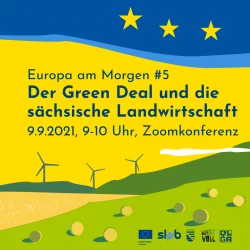 The online panel discussion of 9th September 2021 is now also available on Youtube (in German):
The online panel discussion of 9th September 2021 is now also available on Youtube (in German):
Europa am Morgen #5: Der Green Deal und die sächsische Landwirtschaft
The regional supply of food has long been an important part of urban-rural relations in Europe. However, due to the globalisation of agricultural systems, cities are hardly fed from their surrounding countryside anymore. In addition, biodiversity in our landscapes is declining enormously, for which agriculture is seen as the main culprit. Also in Saxony. So how do we get back to regional cycles, to more nature and diversity in agriculture? The European Green Deal adopted by the EU promises a turnaround back to regional production and food systems and a stronger integration of nature conservation and agriculture. In our online discussion, we examine the package of measures for its potential to strengthen regional value-added structures, forms of sustainable land use and ultimately regional cooperation between urban and rural areas. In doing so, we explicitly take a look at the situation in Saxony.
On the podium:
Robert Gampfer is responsible for climate and environmental policy at the EU Commission Representation in Germany.
Bernd Laqua is mayor of the municipality of Bennewitz in the Wurzener Land. The non-party mayor is in office in his second term until 2027.
The event was supported by the projects WertVoll and OLGA.
September 2021
For the annual Stadt-Land-Plus status conference, where all funded projects report on their activities, progress and challenges, we created a video pitch. Here you can see the result:
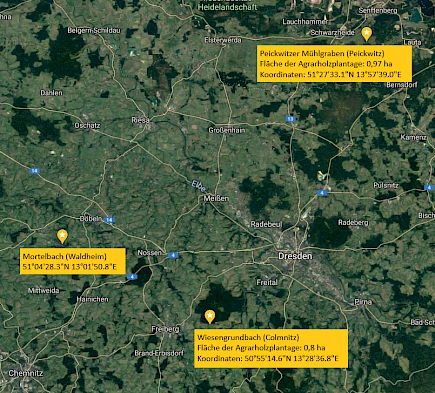
Since May 2021, the TU Dresden has been running measurement campaigns on the watercourses and in the agricultural wood structures in Peickwitz, Klingenberg-Colmnitz and on the Mortelbach near Waldheim. In two rounds (vegetation period 2021 and 2022), different parameters will be investigated that describe the functions and services of agricultural wood structures for the flowing water ecosystem.
At the Peickwitz site near Senftenberg, an agricultural wood plantation with the poplar species Fritzi Pauley was planted along the Peickwitz millrace to reduce wind erosion. Directly adjacent to the Wiesengrundbach in Klingenberg-Colmnitz is a 0.8 ha agrowood plantation (a so-called variety garden with poplar and willow trees), which is used as the second pilot area in the measurement campaign.
The following parameters are included in the analyses:
- Water level h [m].
- Flow velocity v [m/s]
- Flow rate Q [m³/s]
- Water temperature T [°C]
- Terrain [m a.s.l.]
- Location of woody plants
- Air temperature and humidity
- Soil water content
- Radiant heat of the sun
- Circumference of tree trunks
- Leaf sprouting and leaf fall
- Rainfall
- Leaf area index
- Tree structure (laser scan 2x per year)
- Vegetation development
- Soil properties
- Wind speed
- Solar radiation
- Air pressure
In addition, the team from the Department of Hydraulic Engineering at the TU Dresden is conducting macrozoobenthos (microorganisms in flowing water) sampling on the Mortelbach in the district of Mittelsachen in order to be able to make statements about water quality and temperature development.
As soon as the first results and series of measurements are available, we will publish them on this website.
Juli 2021
The OLGA project meeting on 14th of July 2021 took place on Thomas Domin's farm in Peickwitz near Senftenberg. In the morning, we visited the agroforestry areas and talked about the diverse ecosystem services that an agroforestry system can provide when appropriately designed. The rows of fast-growing woody plants here in Peickwitz were planted primarily because of the locally prevailing wind erosion. Poplar, willow & co. are lined up in alternation with cereals such as teff or rye. They protect the soil from erosion, bind carbon and can serve for the production of wood biomass and fruits (e.g. rock pear or chestnut). There was also a lot of talk about new marketing strategies that take more account of the land use concept of agroforestry and communicate it to society, such as through "agroforestry eggs", etc.
Likewise, the measuring installations on the OLGA agroforestry trial area along the Peickwitzer Mühlgraben were inspected and the first results of the temperature, precipitation and water flow measurements were looked at. At the end of the measurement series in 2023, they should provide information on the extent to which the woody plants contribute to the protection of the watercourse, e.g. in the form of shading and pollutant input reduction.
In the afternoon, the OLGA partners discussed the current status of the research work in the project. In addition to the first measurement results from the two trial areas, the results of the agricultural woodland potential analysis on watercourses for the Dresden region were evaluated. These will subsequently be further refined and, if necessary, extended to agricultural areas. Furthermore, the Citizen Science survey "How regional is your shopping?", which runs until 30.09.2021, and other participative events and measures in summer and autumn 2021 were introduced.
Juni 2021
The Saxon Ministry for the Agriculture (SMEKUL) is currently setting up a centre of excellence for organic farming in Nossen (Saxony). For this purpose, the Ministry launched a participation process for practitioners of organic farming. Participation takes place via an online survey and anonymously via a so-called active box on the ministry's organic farming website. There, practitioners can rate and value the future research topics of the competence centre proposed on the website and add further topics. Participation is possible until 31 August 2021.
The Competence Centre for Organic Farming is currently being established at the Saxon State Office for the Environment and Geology (LfULG). Its work focuses on applied research, knowledge transfer and an impulse advisory service for existing or future agricultural enterprises involved in organic farming.
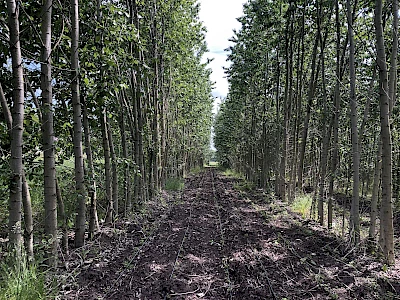 Within the framework of OLGA, Marie Herzig and Lena Schwarz, students of TU Dresden, determined the potential for agrowood to improve the ecological condition of smaller waterstreams in the City of Dresden and the surrounding districts.
Within the framework of OLGA, Marie Herzig and Lena Schwarz, students of TU Dresden, determined the potential for agrowood to improve the ecological condition of smaller waterstreams in the City of Dresden and the surrounding districts.
In order to achieve the goals of the European Water Framework Directive, the significant reduction of substance inputs into watercourses is imperative. For the most part, such substance inputs are caused by erosion from intensively farmed areas. The establishment of agroforestry plantations as buffer strips between fields or grassland and watercourses can relieve the watercourses of substances and enhance the ecological value of the riparian zone. In addition, agroforestry plantations contribute to agricultural value creation.
The presented work serves as a first assessment of the area potentials for agricultural wood on arable land, grassland and brownfields in the Dresden region. After carrying out the analysis, 3,302 areas within the study area come into question for the establishment of agrowood plantations. These have a total area of 13,296 ha, which corresponds to a share of 9.6 % of the total grassland, arable land and fallow land in the study area. It is noticeable that most of the areas have the minimum size, i.e. they are rather small. On average, the area size is 4 ha, with the largest potential area being 33 ha.
Optimally, plantations should be established on special agricultural sites or fallow land so as not to compete with land used for food production. Moreover, agroforestry structures are a valuable climate adaptation measure to reduce increasing extreme events in the the Dresden region.
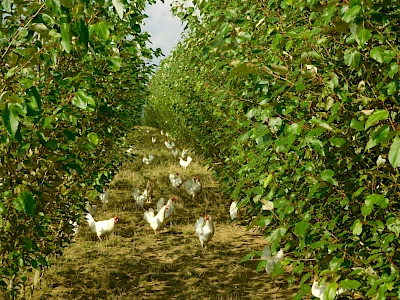
On 10 June 2021, the German Bundestag decided, based on an amendment, to include woody plantations on arable land AND on grassland in the funding. This is a decisive step that will make it easier for farmers to integrate more biodiversity-promoting and climate-adapted measures on their land. And the animals can look forward to more shade and less wind! We are also pleased about this decision.
Mai 2021
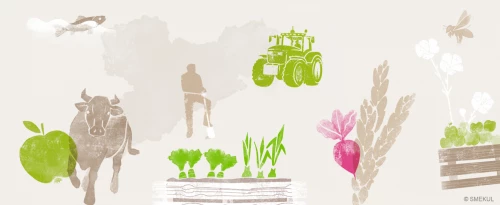
A so-called Bio-Regio model region brings together actors from the fields of agriculture and food industry as well as regional development in order to implement individual concepts for regional value creation in their regions, preferably also with organic food, and to consolidate regional value chains for the benefit of all.
Within the framework of the 1st call for Bio-Regio model regions, suitable associations can apply with their individual concept. The best concepts will be selected by an expert committee under the leadership of the Saxon State Ministry for the Energy, Climate Protection, Environment and Agriculture (SMEKUL). The selected Bio-Regio model regions have the opportunity to apply for funding for their project through the AbsLE/2019 guideline (in German).
More information on the call can be found HERE (in German)
April 2021
The "Bioeconomy model farms" ideas competition is looking for innovative and sustainable ideas for bio-based agriculture and forestry: from the production via the processing to the distribution of food, renewable raw materials and biogenic residues. Our goal is to strengthen value chains in the low mountain regions and to give new perspectives to the people who live and work here.
Individual agricultural and forestry enterprises can participate, but also associations of several enterprises or enterprises with crafts, trade, industry and science are permitted, as long as at least one agricultural or forestry partner is involved. Prize money totalling € 15,000 is up for grabs! Applications are possible until 31st August 2021.
More information (in German)

Januar 2021
Wintery hustle and bustle on an afternoon at the end of January: The OLGA project partners from Module 1: "Sustainable use of energy wood along watercourses and on agricultural land" met in Colmnitz to visit the 0.8 ha agricultural wood plantation on the Colmnitzbach, which was planted in 2007. The area is managed by the Colmnitz agricultural cooperative.
During the inspection, the members of the chairs of hydraulic engineering, forest botany and biodiversity and nature conservation at the TU Dresden discussed the suitability of the plantation as a experimental area, especially for modelling the effects of agricultural wood along watercourses on flood retention, aquatic habitats and on vegetation composition and phytodiversity. The agricultural wood plantation in Colmnitz would be the third experimental plot in the OLGA project.
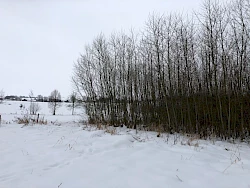
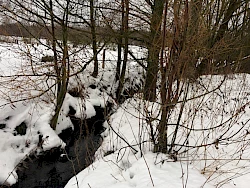
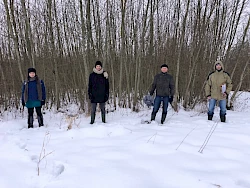
Dezember 2020

The Saxon State Ministry for Energy, Climate Protection, Environment and Agriculture has launched the added value initiative "Sustainably out of the crisis". A total of 26.5 Mio € in funding is available for innovative projects for sustainable agriculture, forestry and fisheries, regional value creation, climate impact management and pioneering energy supply. Project applications can be submitted via an online portal until 31 March 2021.
More information (German)
Saxony presents a feasibility study on strengthening regional value creation and organic farming. The study concludes that there is a need for more networking between actors and less bureaucracy in terms of funding and start-up financing. A separate regional agency is to take care of these tasks in the future. It will serve as an instrument to improve value creation from production to processing to marketing and to increase sales.
We in the OLGA project are working towards the same goals in the Dresden region and have recognised that it is precisely this networking of actors and the development of joint cooperation structures that is needed so that small farms can continue to exist. Offering regionally sustainable products in the Dresden region and in Saxony should be a matter of course.
Press release (in German)
After an introductory speed-dating on project-relevant issues, the project partners reported on their work in the individual fields of action. A trial area was acquired in Peickwitz near Senftenberg to investigate the ecosystem services of agrowood plantations. Another trial area will be visited in January 2021 in the Tharandt Forest. At the "Mortelbach" trial site near Waldheim in Central Saxony, further 3D laser scans will be implemented at the beginning of the year to analyse the structure of the wooden structures near the river banks.
In spring 2021, plant physiological studies will be carried out on the agrowood plantation trial area in southern Brandenburg. Potential analyses for sustainable agriculture and energy wood cultivation in the Dresden region are going on. The results will be published here soon. The partners are preparing a public discussion event in Dresden on regional financing instruments and cooperation structures for mid-2021 with the hope of meeting there in an analogue format and thinking about sustainable city-regional solutions in the field of food in person. Networking with stakeholders and regional initiatives are currently in process.
The next OLGA network meeting will take place at the beginning of March 2021.
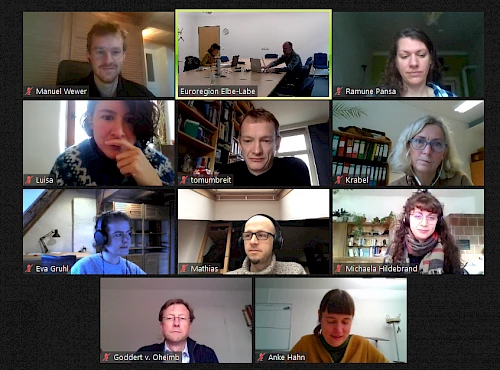
11 / 89
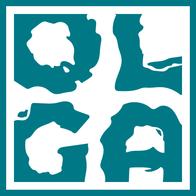
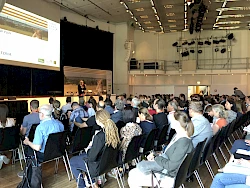
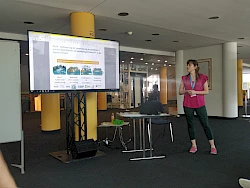
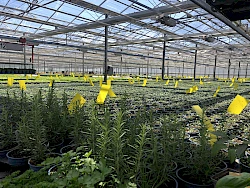
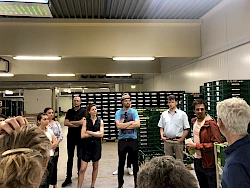
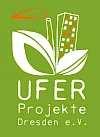 Unser Kooperationspartner UFER-Projekte e. V., die sich für ein grüneres, gemeinschaftlicheres und nachhaltiges urbanes Leben in Dresden einsetzen, sucht eine Person für die Öffentlichkeitsarbeit am Standort "Alte Gärtnerei" in Pieschen.
Unser Kooperationspartner UFER-Projekte e. V., die sich für ein grüneres, gemeinschaftlicheres und nachhaltiges urbanes Leben in Dresden einsetzen, sucht eine Person für die Öffentlichkeitsarbeit am Standort "Alte Gärtnerei" in Pieschen. 